Dev Diary VII: Götterdämmerung
Welcome back to possibly our largest dev diary yet for The New Order: Last Days of Europe. This diary, fittingly titled Götterdämmerung after the last of Richard Wagner’s cycle of four dramas, ending with the destruction of the Gods, will go over the German Reich and its situation in 1962 and its descent into madness.
Germany in 1962 has become an unmanageable hell for the Reichstag. In the aftermath of the 50’s Crash, the economy remains absolutely frozen. The German does not work anymore, despite meager attempts by the government to encourage a return to the factories and the army, as the massive slave caste has taken up the mantle of running almost the entirety of German industry. A pyrrhic victory against the resurgent West Russian Revolutionary Front led to the frontier being pushed back west, and the German military withdrawing from many of its eastern posts.
Now, defense of the colonies is mostly left to native SS divisions, but that has not stopped the Heer from receiving more and more funding, the bubble growing further as money seems to be printed just to enter the military and promptly disappear. Despite spending possibly the most on its military out of any nation, even with the weakest economy of the world superpowers, the German military is increasingly outdated, inefficient and rebellious, and like the industry of Germany, has grown increasingly reliant on foreign SS divisions to carry the heavy weight.
If these were not enough issues, the youth of Germany have been in open revolt for months. With the black market out of control and the economy increasingly reliant on it, the youth have become inspired to battle the regime in the streets, demanding an end to the slave system, an end to political repression, the abandonment of the frontiers, and so much more. Despite having been grown on the spoils of these systems, it seems a generation of Germans would now rather see their own safety net burned out from under them.
And even without the youth rebelling, the greatest threat to Germany dwells within. With the German SS under Heydrich acting as little more than a front for Himmler’s own ambitions, the SS has become increasingly rebellious. Secret arms caches have been built up around the country, and the SS has increasingly segregated itself from the rest of the military, keeping to its own bases and plotting unknown plots.
The SS itself is increasingly divided as well, with the drafted SS enlistees from the colonies more and more removed from their command in the west, many of the power players in the Reich have been attempting to court their commanders to their side to give them an edge. Often, they work as little more than mercenaries for the highest bidder, using these regiments as tools in the byzantine political game that is the Reich.
And what a game it is. German politics are hardly stable, but the government has managed to corral its thousands of issues somewhat until 1962, during the celebrations of the German moon landing, where a series of events shook Germania to its core:
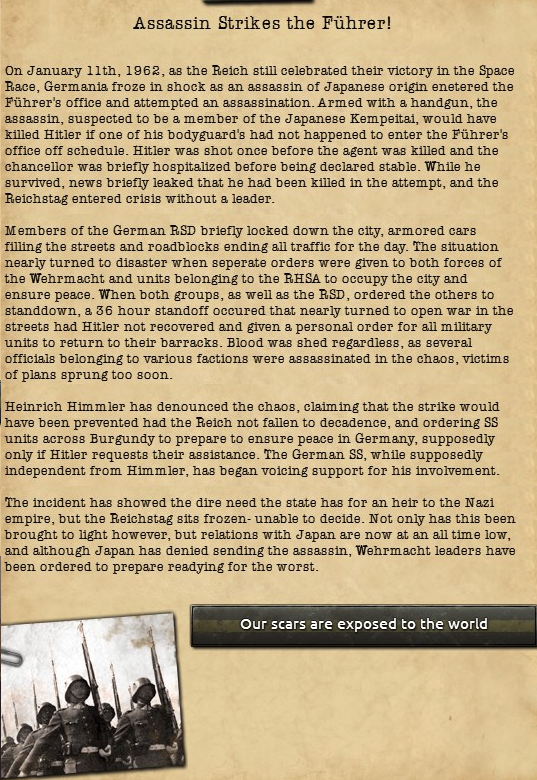
The Führer has no heir, and the attack against him has shown this more fully than any event before. If Hitler is to die, there is nobody to replace him, and even while he lives, the dogs nip at each other, vying for whatever power they can grab.
In the Reich, four have announced their bid to the candidacy.
Speer, leading a coalition of liberals, moderates, and dissenters against the regime, has become the face of the growing student protests. Crowds around the nation chant his name, ‘Speer jetzt!’ has been a rallying cry, as more and more put their faith into Speer as the one who will finally bring positive reform and change to the Reich.
However, Speer may have popular support in the youth, but elsewhere he is left wanting. The past generations and those who rule in the Reichstag in the military have firmly refused to allow Speer anywhere near power, and claim that the Führer’s favoritism to him is nothing besides foul manipulation on his part. While he has gathered a small scion of support in the military and the government, it is too little for many to consider him having a strong chance at winning.
The choice lies with the Führer however, and little can truly claim to have knowledge of what Hitler plans on doing at any one moment.
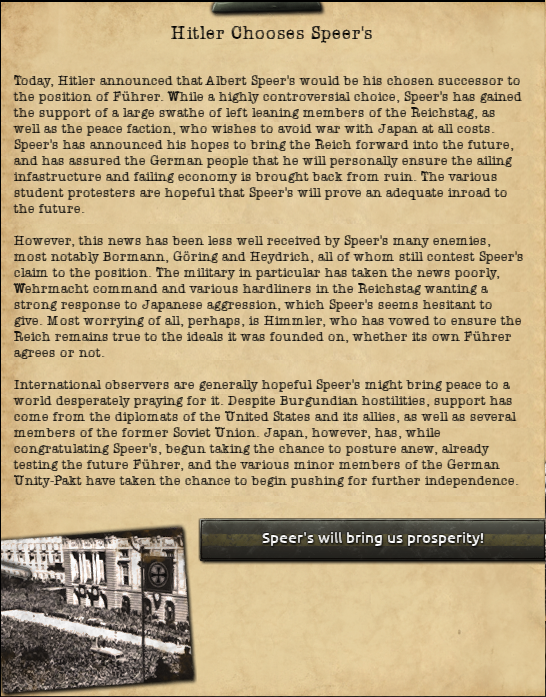
The next choice, and most obvious for most, is Bormann. A strict conservative, Bormann has appealed to the masses by claiming there is no real threat to Germany at all. The military is stronger than ever, the Reich spans from west to east, and the faults in the economy are nothing besides the foul manipulations of the many enemies to the Reich, from the Americans and Japanese to the untermensch and the bankers.
Bormann has the widest base of support in the Reich. Most Germans simply want stability, and Bormann, the great negotiator, claims to have the means to give them this. Further support can be found across the Reich, as Bormann has won over the majority of the Reichskommissars and the various puppet masters of Europe.
Not only has Bormann won the politicians, but the military has drifted towards him as well. While split very closely between him and Göring, the military nonetheless has taken to his call for even further military spending and claims that the armed forces of the Reich are already almighty have resonated with the soldiery.
While Bormann seems to have the best shot at winning the Reich, that does not make him a good candidate. Many have pointed out that Bormann seems to have no economic plans, and his diplomatic ideas seem to mostly involve unending bluster and forcing arguably stronger powers in the Cold War to bend to Germany’s wims as they did once before.
However, a lack of any good policy or sanity in the administration has never stopped Germans before, and many who don’t even agree with Bormann have sided with him out of pure survivalism.
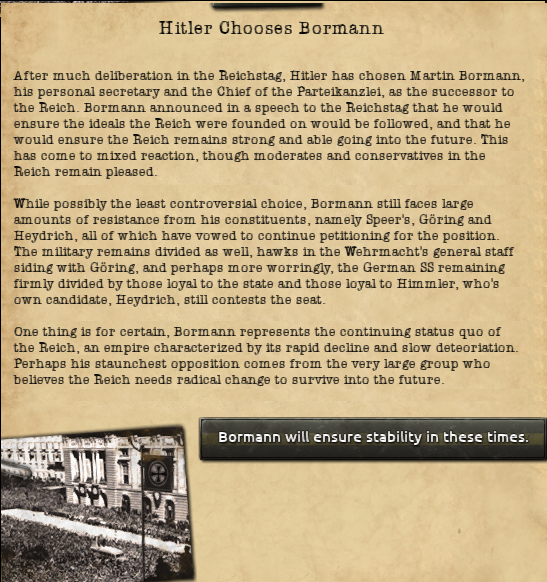
Of course, he and Speer are not the only ones vying for power, Göring has also announced his bid and has split most of his support with Germany. While Bormann claims the military needs little if any reform and bold posturing against the world will show others Germany’s might, Göring has taken it a step further.
Bold military adventures and the return of what made Germany great: war! Göring has promised all that the world will see the iron fist of the Wehrmacht once more if they do not dare bend to the will of the Reichstag. Has has already specifically called out the neutral nations of Europe, who have not been forced under the Reich’s will: Switzerland, Sweden, the Balkans, all of these tumors in the heart of Europe must be purged for the greater will of the Reich.
The Reichskommissars, increasingly rebellious and distant? Bombing campaigns will show them they shouldn’t dare to threaten their betters. America and Japan, ever growing stars threatening the glory of Germany? An army matched by no others will show them that they should fear the great Reich.
The ailing economy? Simple, Germany once found its power in war, and it would be simple to do so yet again, what worked once can simply work again. And the students and rioters in the streets? A bullet proves to be the most efficient negotiator that the government has ever employed.
Many have pointed out that an unending state of war across the world may not exactly be the greatest idea for a world seemingly on the verge of nuclear war, and that blowing the military bubble up further may quite possibly pull the plug on Germany’s economy, but why would anyone listen to such nonsense when they could simply sing a marching hymn and remember the glory days of the Reich?
Göring’s support is as widespread as Bormann’s. While Bormann has captured those idealists who like to believe Germany is just as great as ever, Göring has captured the extremists of this ideal, and the military especially. A soldier spoils for nothing more than a good fight, and Göring has promised that more so than anyone else.
And finally, there is the dark horse in this competition.
Reinhard Heydrich.
The Hangman. The Butcher of Prague. The Young Evil God of Death, and more relevantly, Himmler’s Evil Genius. While he came close to death in the 40’s after an unsuccessful attempt on his life by Czech partisans, he has used the attack as a learning experience, and increased his brutality ten fold. So feared and reviled that even the rest of the Nazi party seems to fear him, few expected Heydrich, openly known for being a puppet to Himmler and widely hated, to ever reach such heights.
But with guile, politicking, and a string of mysterious deaths, Heydrich was able to usurp control of the entirety of the German wing of the SS. Slowly, he has gathered more and more power around himself, creating a cabal of the furthest right and utterly extremist that the Reich has to offer. Like the others, he has placed his bid for candidacy as well, obviously on the behest of Himmler, like most of his actions.
While he has no real support, even less than Speer, the SS is beholden to him. While most of the German military has degraded, the SS has continued its strict training regime in preparation for whatever Himmler and Heydrich have planned. In addition, the foreign SS units which the Reichskommissars have grown reliant on are equally split, their commanders equally having pledged loyalty to Göring, Bormann and Heydrich.
Heydrich does not run on policy, he does not run on sense, he runs because he has been ordered to do so. Few expect him to have any real bid to the candidacy, but perhaps it won’t be political minds that decide the fate of Germany…
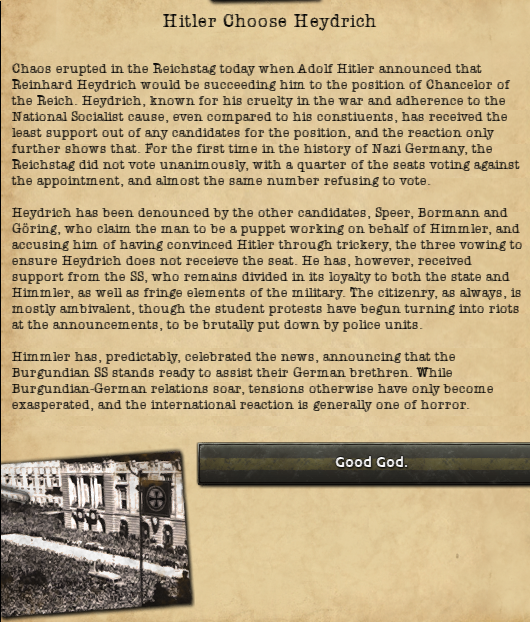
No matter who is chosen as the next leader of the Reich, the line has been drawn. The candidates openly despise each other, deriding one another at every turn, and the decision will only further radicalize the opposition, no matter who is chosen.
The wheels turn in Germany, and the situation only seems to be getting worse,
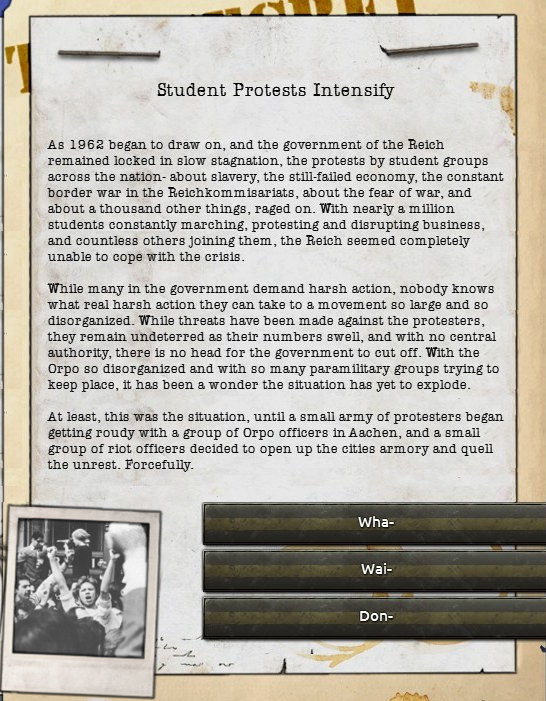
And worse
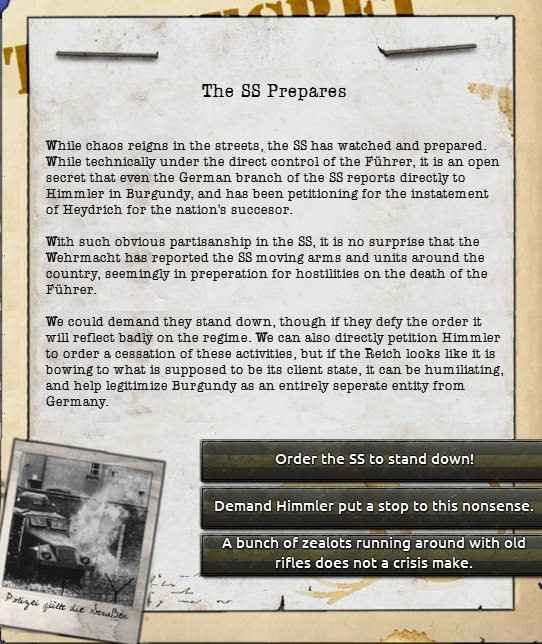
And worse
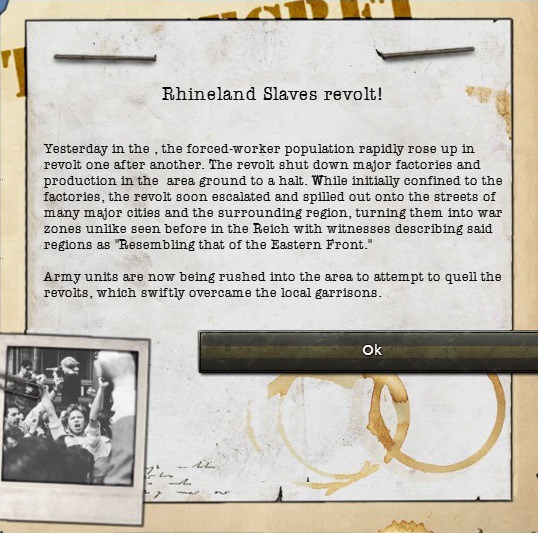
Some of these situations will be managed with the upcoming variable system in Cornflakes, allowing things like the militarization of the SS, the unrest of the students and the organization of the slaves to be monitored and spiral out of control:
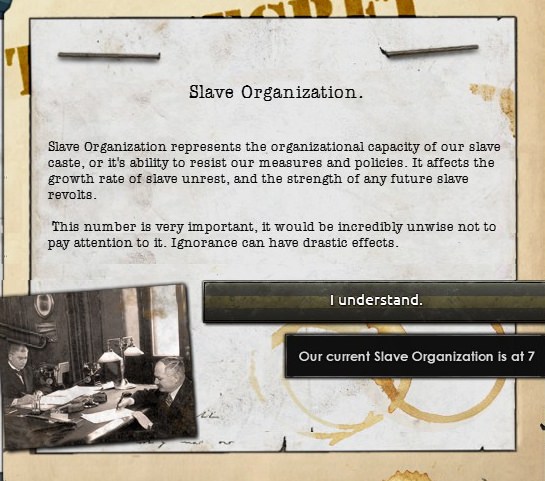
But all of these things are simply too much for the fragile German government to manage. The only thing keeping the nation alive for now seems to be the mutual respect of the Führer, and as long as Hitler is alive, Germany may just remain alive. On a knife’s edge, but alive.
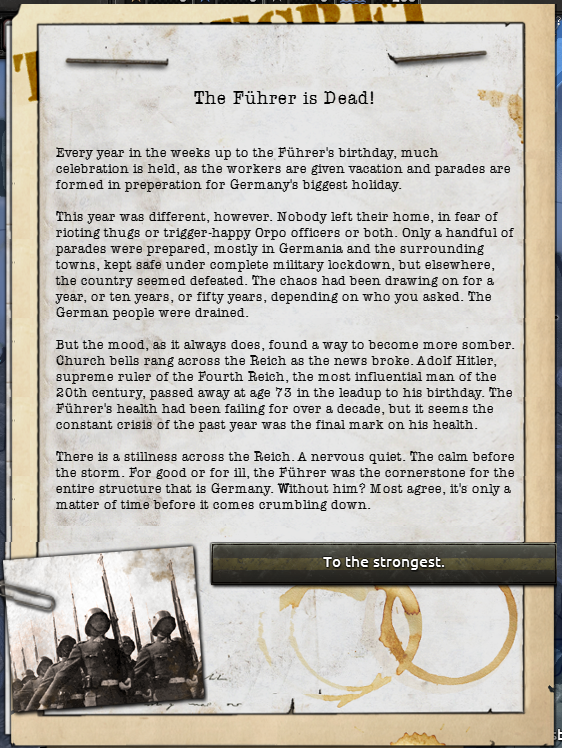
Of course, this is not meant to be. And Germany is going down.
The nation has descended in a death spiral, there is fighting in the streets, gunshots are starting to echo across the country. It seems that Germany may have finally gone over the tipping point.
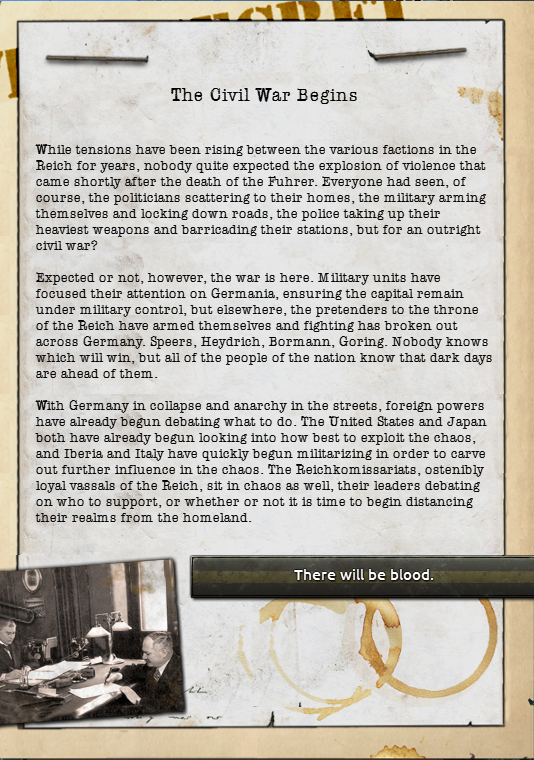
There will be no negotiation. There will be no understanding. There will be no peace. This is war, only one man can lead the Reich, no matter what the Führer wished, and all others and their treasonous supporters must die for the good of the Reich.
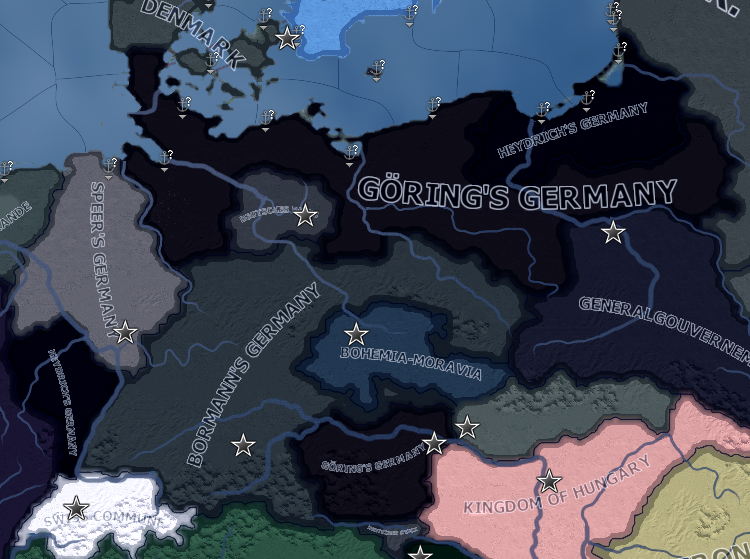
The lines are drawn as the various pretenders to the throne of Europe’s largest empire all rush to their largest bases of support. Each side represents a unique threat to the others, whether it’s Bormann and his massive support in the military, Göring and his fellow supporters in the military as well as control of the Luftwaffe, Heydrich and his elite SS divisions and endless funding from Burgundy, or Speer and his wide breadth of support across the entire Reich.
The German Civil War is a brutal affair. There is little mercy in the hearts of the contenders, and each side has enlisted the entirety of their possible supporters to their cause. Men, women, and even the children must fight in this final battle.
The Reichskommissars are equally split, many professing loyalty to the various sides, mainly Bormann, or declaring neutrality. With the fall of central authority, many others have used this as their chance to finally break free of the Reich, or to settle old scores with each other and Germany proper.
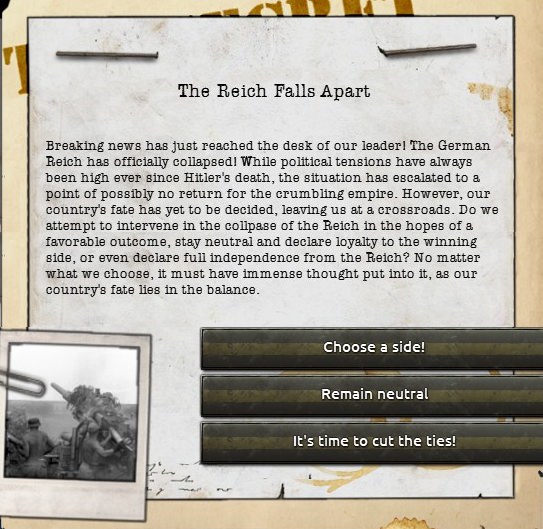
Support across the world has come funneling in as well, and not just from Burgundy. The United States, Japan, and numerous other countries have a role to play in the future of Germany. The favorite of most of the international community is Speer, who is seen as the best chance for the Reich to avoid a nuclear war, but some support has also found its way going to Bormann, hoping his administration will kill the Reich more readily than any war.
While the four contenders begin their quest to burn Germany in their name, the Reichstag is in chaos. Those who support one side or another, the majority of the politicians, have rushed off to join their masters. The police and local garrisons in Germania have managed to lockdown the city and its surrounding suburbs, despite skirmishes, and have declared martial law, already digging in and preparing to keep the capital safe at any cost.
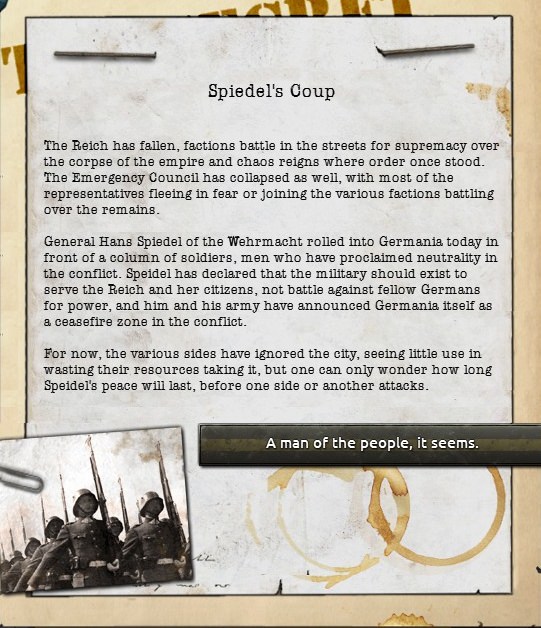
The widespread chaos across the nation has inspired those few in the military still neutral to mobilize. They have rallied behind two figures, conservatives Hans Spiedel and his former commander, Erwin Rommel, who have taken control of the garrison in Germania and brought their men to the city, declaring much of central Germany a neutral zone.
From Germania, they have taken whatever control remains of Germany outside of the homeland. The bases in Crimea, the neutral Reichskommissars, and the various embassies across the world.
At the beginning of the war, Spiedel and his men start neutral to the rest of the pretenders and in control of Germania, but as the war goes on and one side begins taking power, their area of control can slowly recede until it is only Germania proper. If one side becomes dominant, or if any become desperate enough, they can try attacking Spiedel’s forces and taking control of Germania, despite the possibilities of destroying the city. If one side chooses to do this, the others may panic and jump on Spiedel and his men in order to ensure Germania remains out of the others hands.
If nobody goes to war against Spiedel and defeats their opponents, Spiedel will choose whether to lay down his arms and welcome the victory or continue resisting this new authority, depending on the contender, but normally weighted towards the former.
There is too much to go into the entirety of the Civil War here, it can quite possibly be its own diary. But let’s look past the Civil War, and go over the trees for two of the possible leaders of Germany. Speer, and Bormann.
Speer’s Reich:
Speer had every obstacle in front of him, whether it be the hatred coming from the establishment of the Reichstag or his rebellion beginning his biggest rival with Heydrich, but against the odds he has prevailed. Speer’s enemies are dead or imprisoned or fled abroad, and besides a few of the most zealous holdouts and Reichskommissars, all have recognized the authority of the new Führer in the Reichstag.
Speer’s enemies are still legion, however, and the problems ailing Germany have not gone away with an apocalyptic war. However, in power, he has radical plans on how to save Germany from her woes. The government must go left, it must throw off its outdated trappings, it must reform its military and it must cut off the chaff.
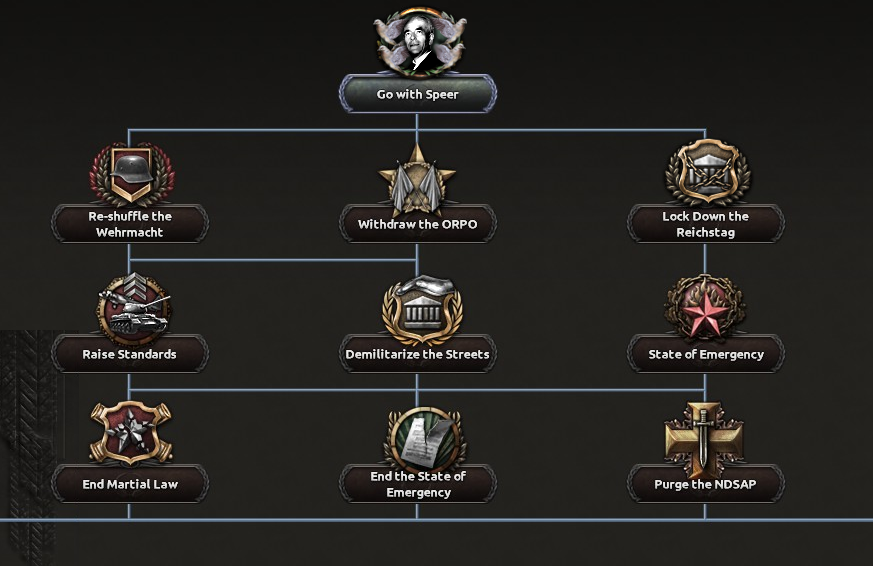
First, Speer must begin reorganizing the nation to recover from the fallout of the war. While Bormann and Göring have similar sized trees, this is only half of Speer’s recovery effort that he must undertake (more on that later). For now, he must restore order to the anarchy that has enveloped Germany, begin purifying the military of his opponents, and begin bringing stability to the nation.
Speer can not risk mass purges of his rivals, simply too much of Germany was opposed to him in the war to do so. In order for his administration to survive, it will have to treat with many who stood against it. This means that Speer’s path is fraught with danger, too rapid reform will bring resistance, and one can only imagine what would happen if he infuriates his colleagues enough to bring unrest back to Germany.
Once this is done, Speer begins his tree proper. Starting with the military.
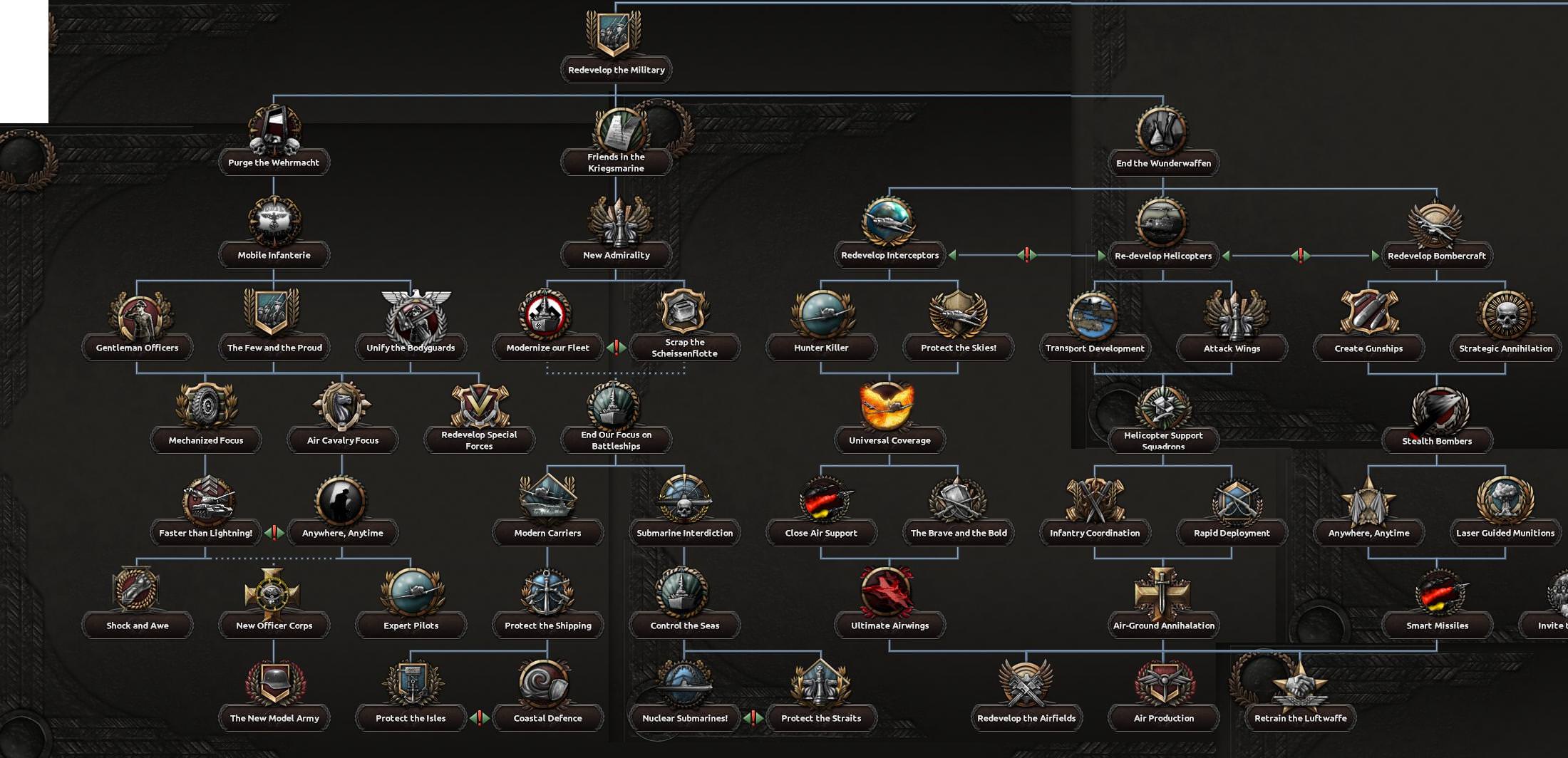
Speer has possibly the smallest military tree of the four players, matching his ideas of a smaller, more focused Wehrmacht.
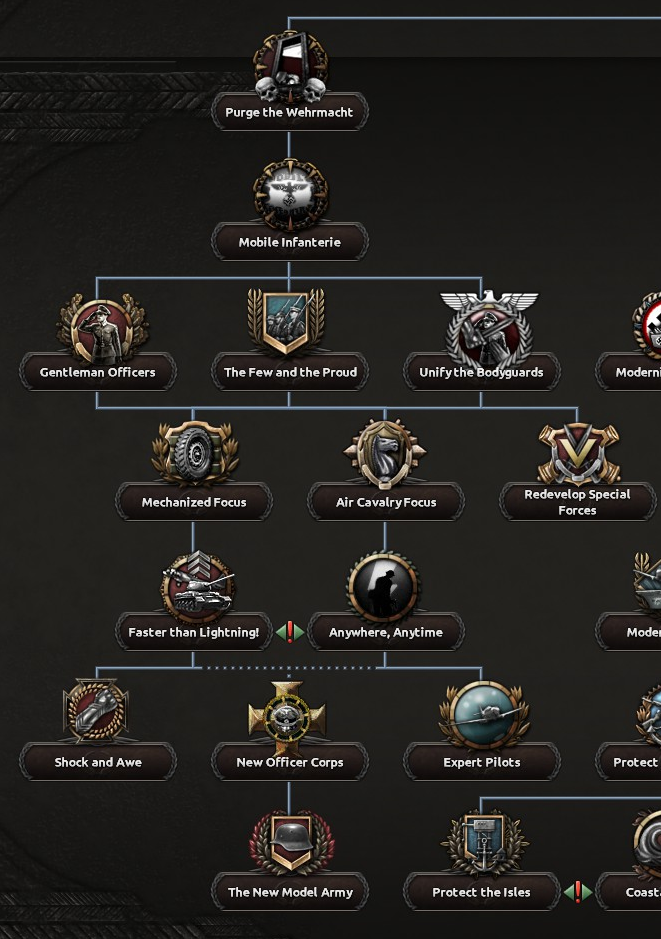
First, he must reform the branch most against him, the Heer. The Heer’s commanders are still openly rebellious against their new master, refusing to be led by a more pacifistic leader who openly speaks of cutting the massive military budget the Reich has built up over the years. Further purges will be necessary, and much of the tree is focused around building up a new and more loyal officer corps.
In addition, Speer can unify the multitude of bodyguard units into a more elite and well prepared force, instead of a smattering of mercenaries constantly squabbling for favor, and use this to begin establishing a new era of the German Special Forces, able to carefully and quickly execute the will of the government as needed.
The military can also either focus on mechanization or embracing the new era represented by the helicopter. The panzer fleet of Germany is already far too massive for its own good, proving to be more of a money sink than almost any other part of the armed forces, and in an era where Germany must move away from its focus on reliving the great, grand battles of the last war, has no place.
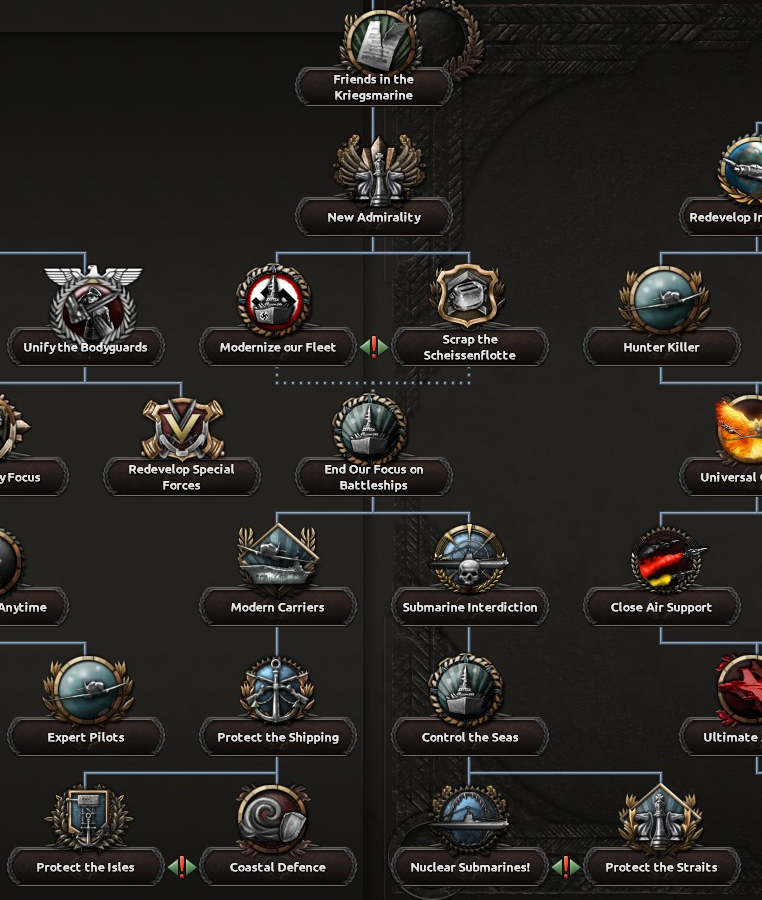
Speer also needs to redevelop the Kriegsmarine. The branch was the friendliest towards him during the war, though still primarily controlled by his rivals, and he can use these connections to try and quickly rebuild the Admiralty with more like minded individuals.
There are two main decisions to be made. Either scrapping the greatly outdated fleet or attempting to retrofit and redevelop it. The first option is the cheapest and can make it much easier for the Kriegsmarine to begin moving forward.
However, this would be controversial, not only among the Kriegsmarine and the conservatives but with the people. Throwing away the fleet would be a demoralizing blow to the people, in an era where Germany desperately needs victories and symbols to rally behind.
Still, no matter what is chosen, the navy needs a new focus. Whether scrapped or modernized, the navy must move away from its obsession with growing its fleet of battleships past imaginable levels. Like much of the German military, they have little place in the modern world and serve as nothing but a money trap. Instead, Speer can focus on either a modern carrier fleet to help Germany project its power overseas, or a submarine fleet to ensure more direct safety of European waters.

The airforce has the greatest amount of variety. With a sharp ending of the Wunderwaffe programs, the funding of the Luftwaffe can be relocated to more pressing matters: focusing and developing its airfleet towards a more singular purpose and goal. The decision has to be made, will the Luftwaffe focus on interceptors and protecting the skies of Germany and the soldiers below? Improving the helicopter fleet and using it to multiply the effectiveness of the infantry? Or bombers, and begin an era of smarter, more focused bombing campaigns, with minimal collateral damage and a rapid destruction of those who threaten Germany.
Finally, the airforce will need to be focused on its new direction. The pilots will need to be retrained, the fleet rebuilt, and focus returned towards using the Luftwaffe’s budget for rebuilding the airfleet instead of squandering it on pet projects and the inane dreams of the Reichstag.
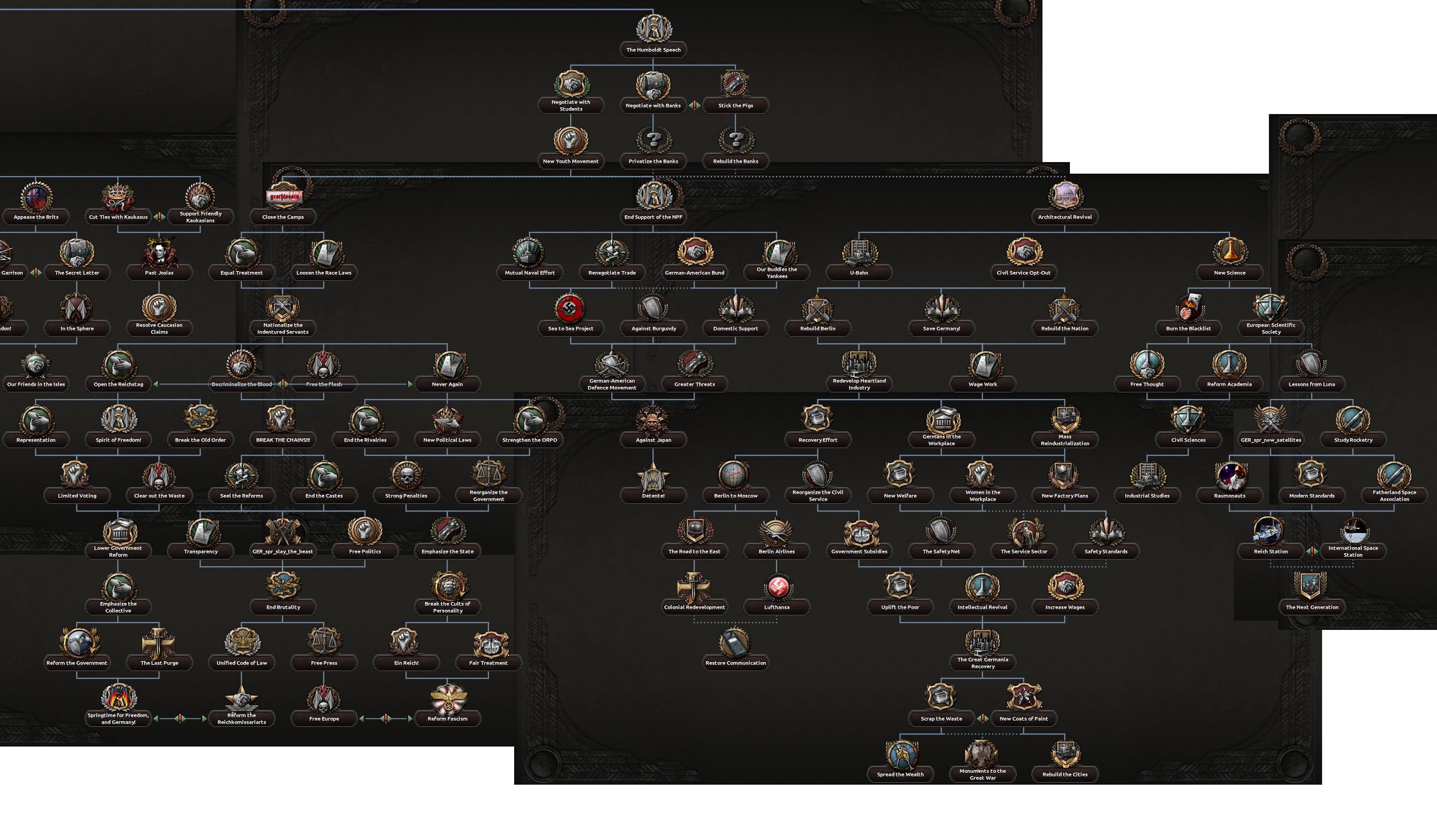
Next, we will look at Speer’s political options, and how he will reshape the Reich.
Before he can do this, however, he needs to finish answering the immediate problems facing the Reich. The students have not left the streets, despite their favored leader having taken control, they still have demands to be heard, and with the students having organized and armed themselves, they are a more pressing matter than ever. Thankfully, with Speer, they are more manageable, and it shouldn’t be too difficult to assure them that change is coming.
The banks are also an ever present issue. Having taken control of the Reich’s economy years before and grown just as corrupt as the government they worked for, a decision must be made to either negotiate with the banks and fully privatize them, hoping to control them with laws and bureaucracy, or to break the banks and arrest the bankers, and reform the Reichsbank as a stable arm of the government.
With this done, it is time for Speer to begin dragging the Reich back into the light.
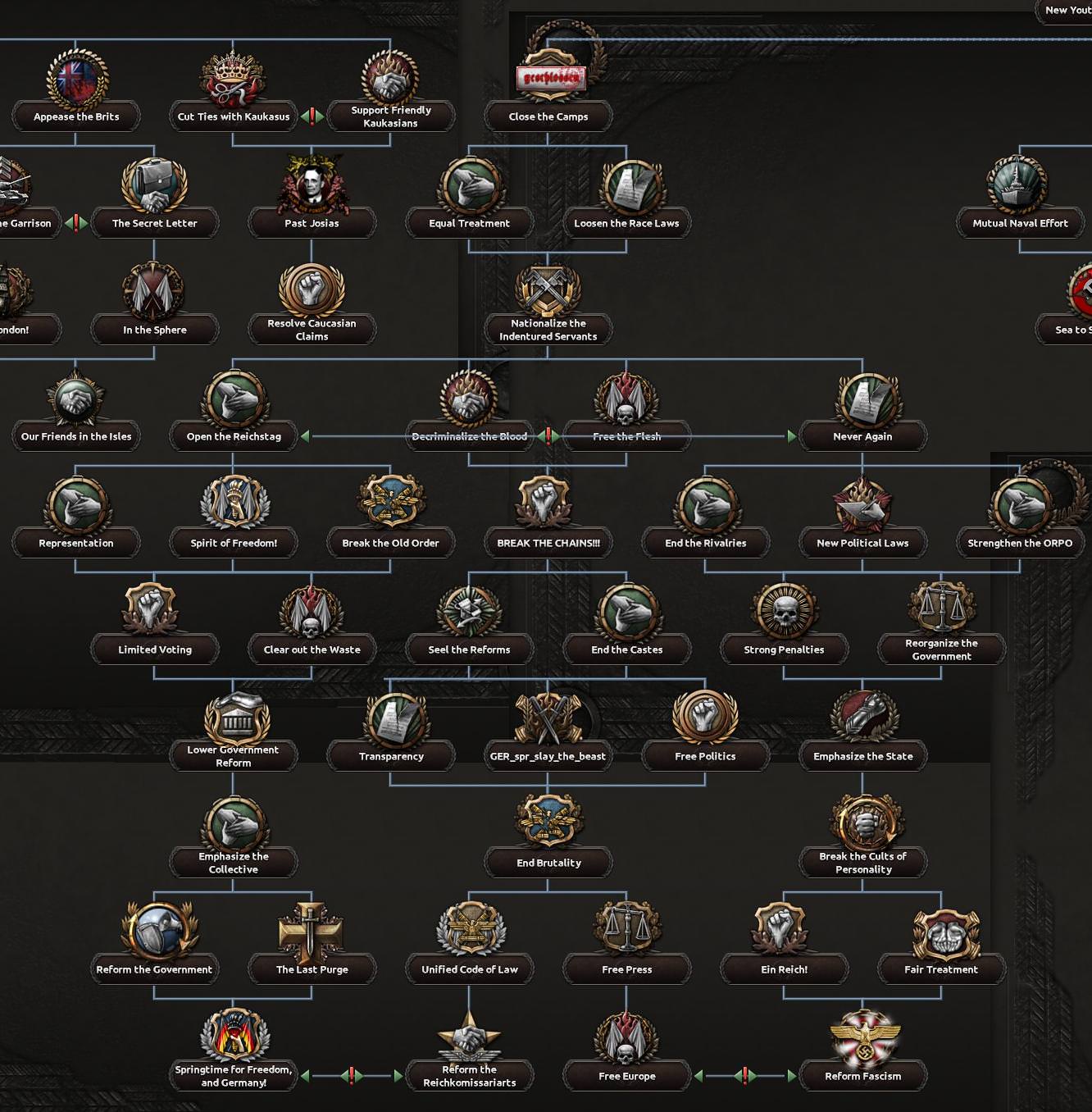
Speer has a long road ahead of him to end the caste system and reform the German political system. He’ll be fighting the Reichstag every step on the way to push through his reforms, and if he has not yet gone through his industrial tree, can possibly cause the Reich’s economy to finally spiral out of control, its final lifeline cut.
Assuming Speer can successfully navigate the minefield that is trying to end the Reich’s obsession with racial superiority, however, he has the best chance of a strong solution to the caste system. By ending the divide and uplifting the slaves, he can redefine what it is to be the National-Socialist male. Instead of based on race, the strength of a person will be decided on his loyalty, his dedication, and his work to improve his nation.
He must also decide on the political future of the Reich. Speer can either be an Authoritarian Democrat, wishing for a democratic system to decide the Reich’s dictator and his subordinates, or an Italian style Fascist, working towards a less byzantine and inhumane system, where the Führer acts as a benevolent dictator, with the force of law preventing him from the worst of excesses.
Both paths are fraught with danger, though Germans will of course be much more open to the second option. Each path also gives him a decision on what exactly to do with Germany’s sphere across Europe. Speer may either choose to, as a Fascist, reform the Reichskommissariats to follow the new laws of Germany and follow its new laws and reforms towards benevolent rule, or can try to break the German tin-pot-dictators and their military regimes entirely, and try to restore Europe to some semblance of sense.
The first option will lead to the Reichskommissars reforming and following the party line or refusing and bringing them in conflict with the Reich, if Speer decides to pursue them instead of letting them isolate. The second is much more extreme, and will lead to Speer attempting to break German domination of Europe in favor of local regimes taking control back, giving control of the east back to the Collaborators who serve under the Reichskommissars and attempting to redraw Europe’s borders once again, under the Unity-Pakt. Of course, if Speer has managed to avoid conflict until this point, this would most likely come as the final straw to most, and one can only imagine the natives might not be so happy to continue working under the Reich once given power.
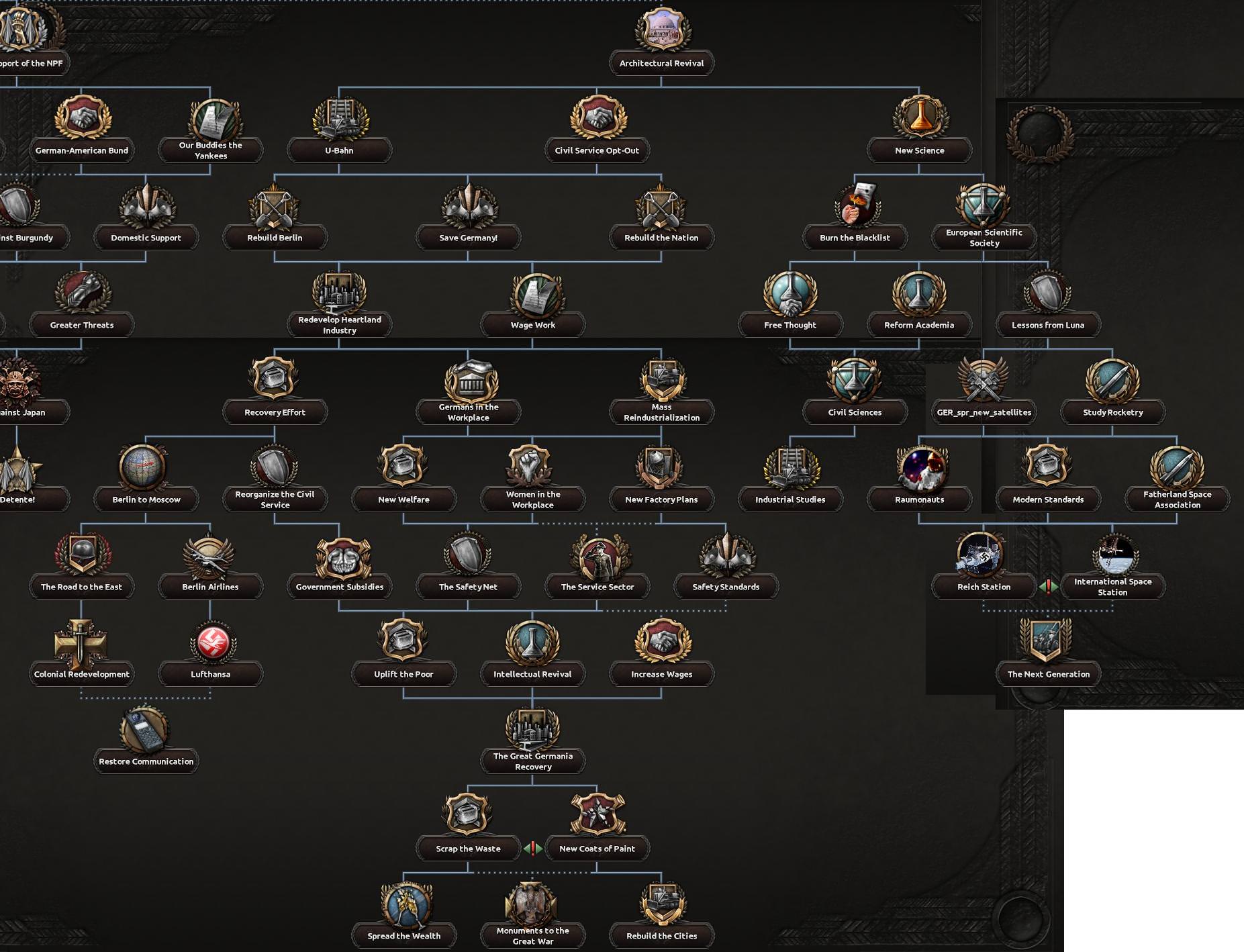
Also up to reform is Germany’s industry and science sectors. The nation was already crumbling before the civil war, and dropping tons of bombs on it and starting gunfights on every corner seems to have made the issue even worse.
Speer is, if nothing else, however, an architect.

Speer envisions great things for Germany’s new infrastructure and industry plan. Starting with two things: rebuilding the U-Bahn and reforming the nation’s limited conscription plan to include Germans again, but also a civil service aimed at dragging Germans back into the nation’s economy.
With the U-Bahn completed, commerce can once again begin flowing throughout Germany, and with the roads expanded and redesigned for modern vehicles, can begin moving more industry than ever before.
With a proper civil service being built up, slowly introducing Germans back into the workforce, the nation can finally achieve the skilled labour force necessary to complete Speer’s ambitious projects. The slaves are hard but unreliable workers and and can not be be trusted with the proper rebuilding of the nation, they so vehemently despise.
This is however only the beginning. Germania and the nation at large must be rebuilt, almost from the ground up, and massive amounts of workers and capital will be needed for this. In addition, millions of refugees and victims of the civil war now roam the nation and will need proper assistance and strong guidance if there is any hope of stabilizing the nation before it slides back into anarchy.
Eventually, the tree more or less splits. Germany will need to further ensure Germans enter the workforce by enticing them to work with an official welfare program, actual safety standards in the factories, building up a service sector, and ending the gender gaps preventing the nation from properly utilizing more than half of its population, with thousands upon thousands of dead men due to the conflict.
The projects to revitalise Germany will also continue, with further efforts to clean up the destruction from the war, followed by further expansion of the German infrastructure. The grand plans to build roads across Europe under a single standard will finally be completed, civilian air travel will be encouraged and subsidized, and the Reichskommissariats will be raised to this new standard.
Ultimately, it must be decided how Speer will tackle the colossal monuments and pet projects he has inherited, like the Volkshalle. Either these massive and slowly crumbling monuments must be abandoned, using the resources on far more pressing projects, or maintained, focusing on the symbolism and grandeur these express to show the German population that Germany has not been defeated and as an indication of the bright future that awaits Germany.
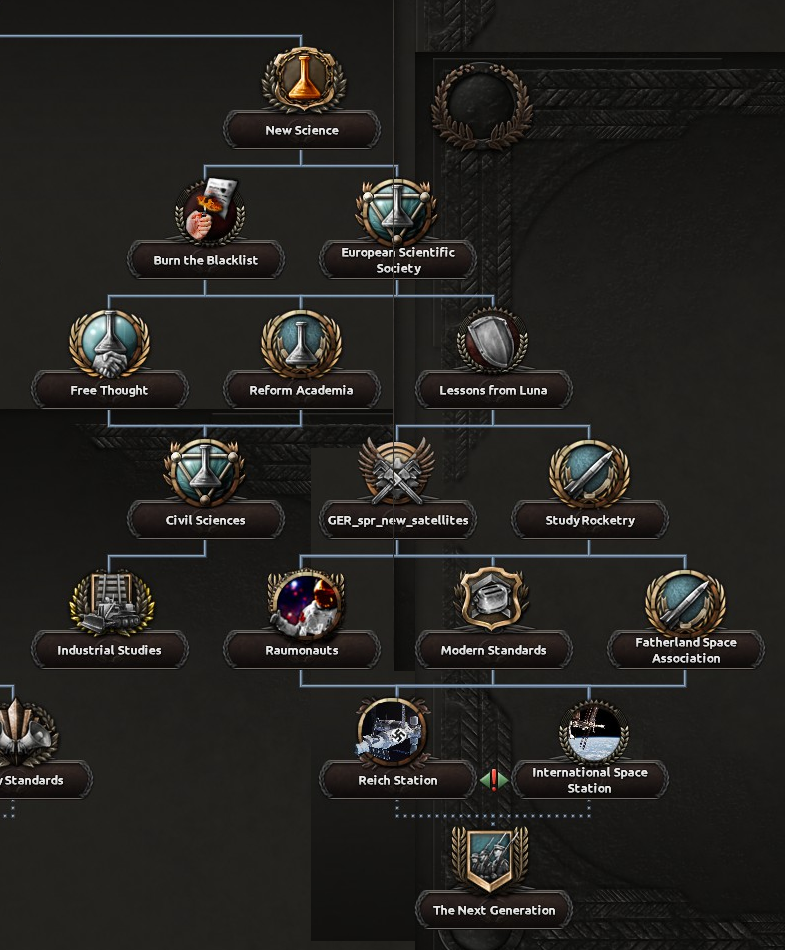
Speer will also focus on reforming German science. By uniting the various science teams of the Unity-Pakt and finally ending the blacklists and restrictions put on the scientific community, especially ending the idea of Deutsch Physik and other nonsense that almost cost Germany its victory in the war by nearly killing its nuclear program, German scientists can finally begin bringing Germany back to the 20th century and beyond.
He can also look further, to the final frontiers, and begin taking the lessons from the moon landing to try and apply them to new missions. Speer has a more involved focus tree for space leading to a limited ending compared to his counterparts, a reflection on more realistic expectations and a desire to see actual scientific progress instead of useless nationalistic chest beating. His final focuses in this tree end with Germany either building its own space station around Earth, or, if it cooperates with the international community as we’ll see in a bit, building an International Space Station to further unite the world’s scientific community and foster positive relations around the world.
And now, onto the largest portion of Speer’s tree. Diplomacy.

The tree has two distinct branches, focusing on the international community or looking inward and trying to reform the Unity-Pakt and the Reichskommissariats into a more stable, capable, organization. In comparison to our reality, the two trees focus on trying to create the UN or the EU, with the prior fitting in with an Auth Dem Speer and the latter matching more with a Fascist Speer, though they are not locked by ideology.
First, we shall look at the international focus.
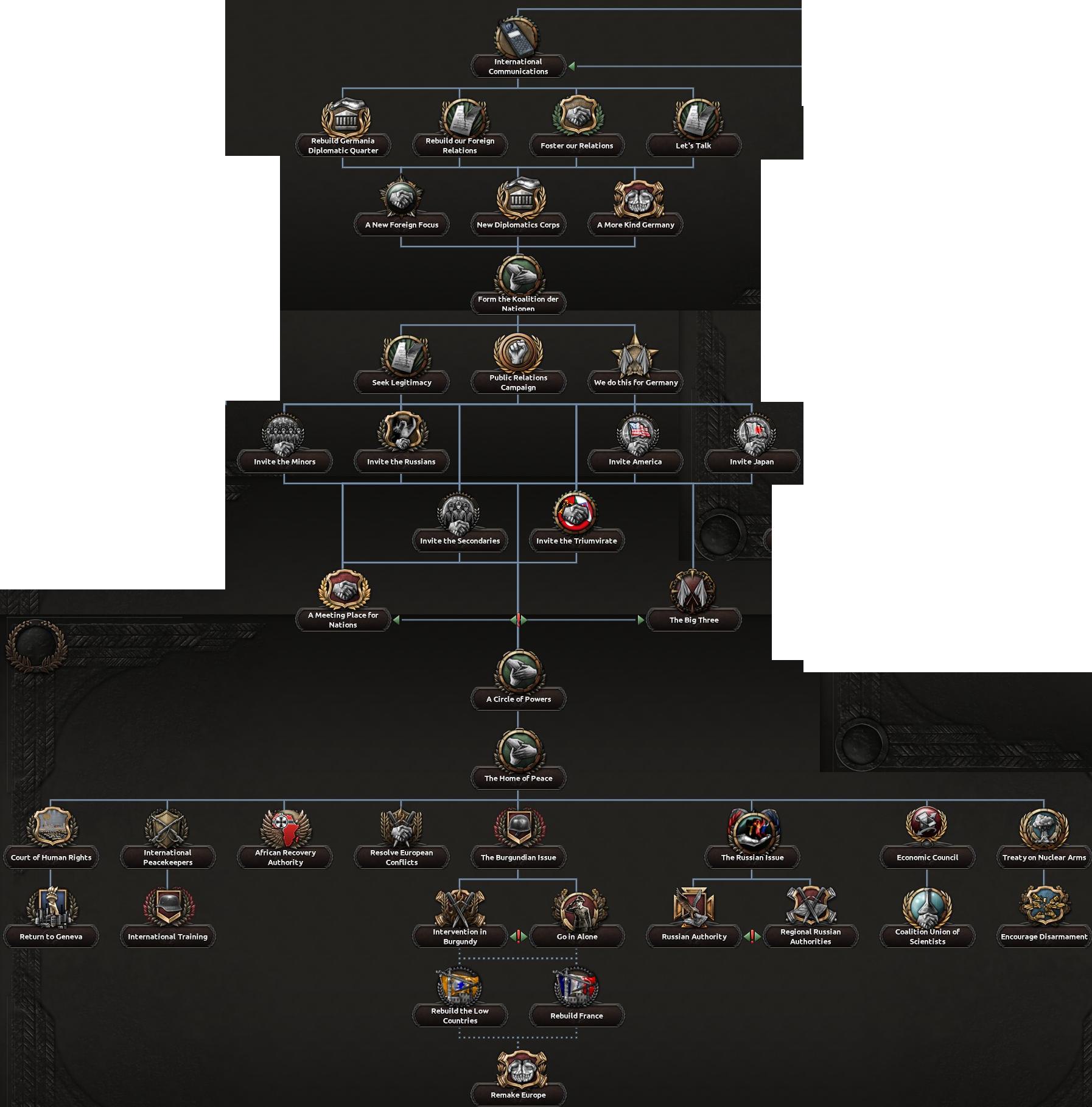
The KN (Koalition der Nationen) tree is shorter because it won’t see its full effect at game start, which we’ll get to later.
The path to build this unheard of organization is a longer one than simply beginning to build up the Pakt, as it will take serious diplomatic efforts to even get the project off the ground. Germany will need to completely change how foreign nations see it, from a repressive regime to a kinder, benevolent one. This, will of course be easier if Speer has already reformed Germany and freed its slaves.
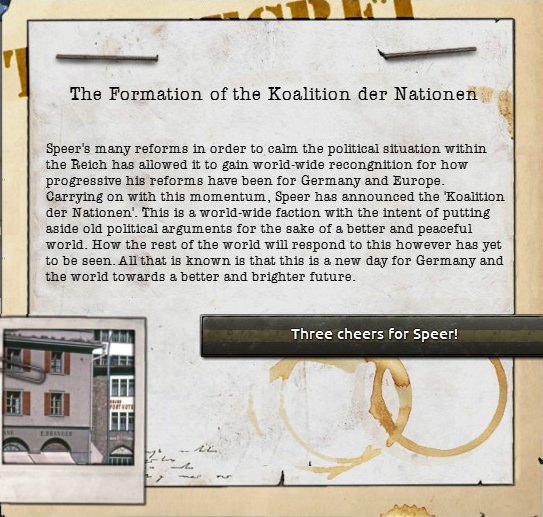
Once the KN is formed, it needs to become an actual organization. People abroad and in Germany must both support its foundation and existence, and nations must be invited as official members. Speer will need to reach out to the Russians, the Triumvirate (or former Triumvirate, more likely), the United States, Japan, the various secondary powers around the world, and of course, everyone else. Acceptance is dependent on the nation being asked, their decision based on their relations with Germany and how they look upon Speer’s reforms. Nations who refuse have a decision to join at any time they choose, and Germany has one to invite them again.
With the KN established and seen as a legitimate body, it finally needs to be decided how exactly it will be run. There are three choices. The KN can be a meeting place for all nations, equally representing all nations of the world, making it a more noble body perhaps but also most likely taking out any teeth the powers that be would be willing to give it. It can be a circle of various powers, forming a Security Council and giving the most powerful handful of nations a greater voice and a floor for them to discuss issues, or it can go on the other side of the spectrum and serve as a floor for the big three players in the Cold War, giving it perhaps the most power it can have but also possibly making it far more polarized than it could be, and disheartening everyone in the organization besides Japan, Germany and the United States.
Regardless of how the KN is built, it must then begin forming its child organizations and working towards what it sees as a better world. The tree here is very temporary, as it will soon make use of the new dynamic focus branches that Cornflakes will give us. Until then however, you can see placeholders that will eventually be expanded.
A Court of Human Rights can be founded to begin uplifting the peoples of the world, show the world that Germany is working towards change and to challenge the Japanese regime. An army of International Peacekeepers can be formed to answer any crisis in the world with a neutral body. An Economic Council can work towards improving and regulating the world economy, and a Treaty on Nuclear Arms can be made to try to calm the tensions around the world and prevent more nations from acquiring WMDs.
And then there’s actual intervention. Issues like the constant border conflicts across Europe, the desolation of Africa, and Russian Warlordism can each be tackled by the KN and solutions decided and mutually worked towards. Chief of all for Germany however, is finding a solution to the Burgundian Issue. The tumor on the side of the Reich needs to be excised, one way or the other. Speer can ask for a KN mission to break Himmler’s madhouse, but if refused, can instead go in alone, and try and solve it himself, possibly betraying the organization he strived so hard to create.

Without the KN, Speer can’t be the pacifist he may want to be. Instead, he’ll have to use his diplomatic abilities to try and keep Germany alive throughout the Cold War and into the future.
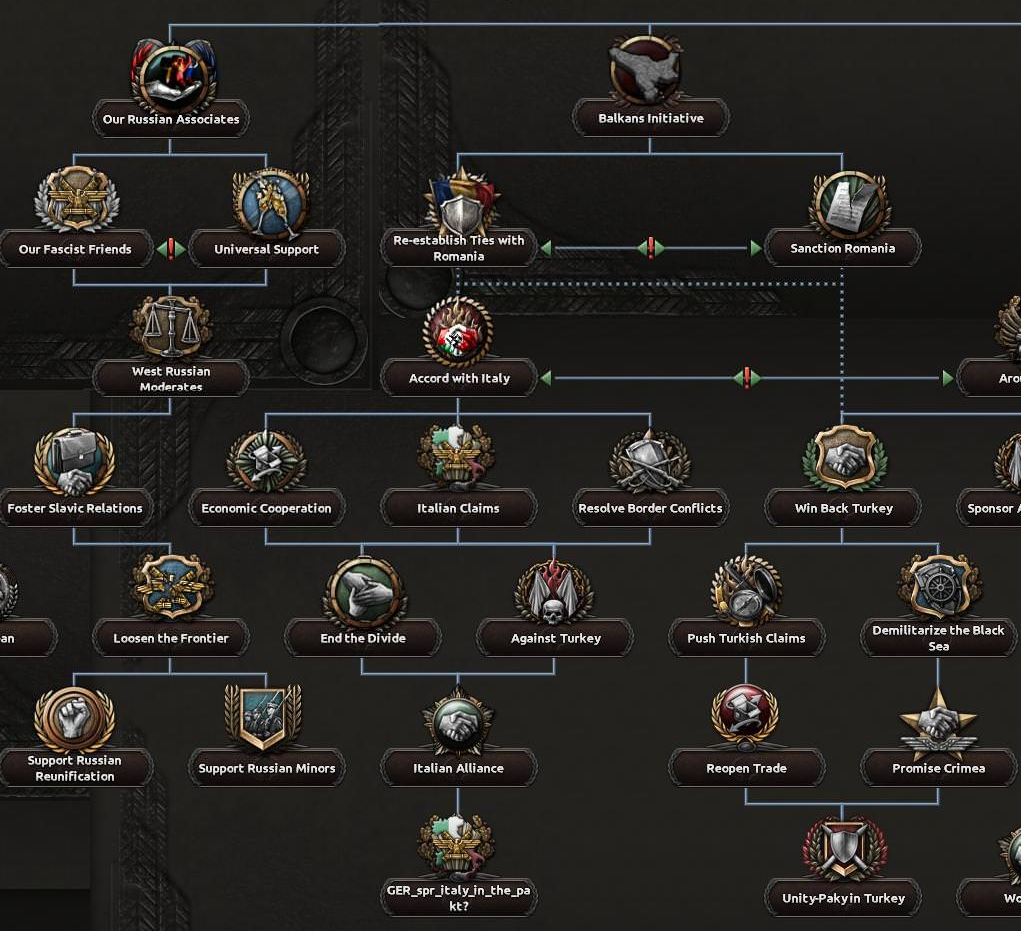
First off is Russia and the Balkans. Speer has the option to attempt to woo either the various fascist warlords in Russia or attempt a more general approach, expanding diplomatic ties with nations in the region regardless of ideology. This can eventually be used to either support a limited reunification into a friendly Russian state that will totally always remain friendly no ifs, ands or buts (it may backfire just a little) or support several of the stronger Russian minors to form a series of smaller, but still friendly and less dangerous nations.
In the Balkans, the chief issue is Romania.
While Romania is now under a different government than the outright hostile one the Reich faced in the 50s, the nation still doggedly refuses to give up its gains and represents a thick wall between Germany and the southeast.
Decisions must be made to either sanction the nation and attempt to go down the road of breaking it up once more or to reestablish ties at the cost of further isolating the rest of the Balkans, but possibly bringing the region’s most powerful nation, besides Italy and Turkey, into the fold.
Regardless of which is chosen, getting past Romania opens options to treat with Italy and Turkey. Both will require concessions on the part of Speer, and treating with one will prevent Germany from befriending the other, but either way, taking one of these two rival nations from despising to Germany to joining her alliance is a gargantuan task and an impressive accomplishment.
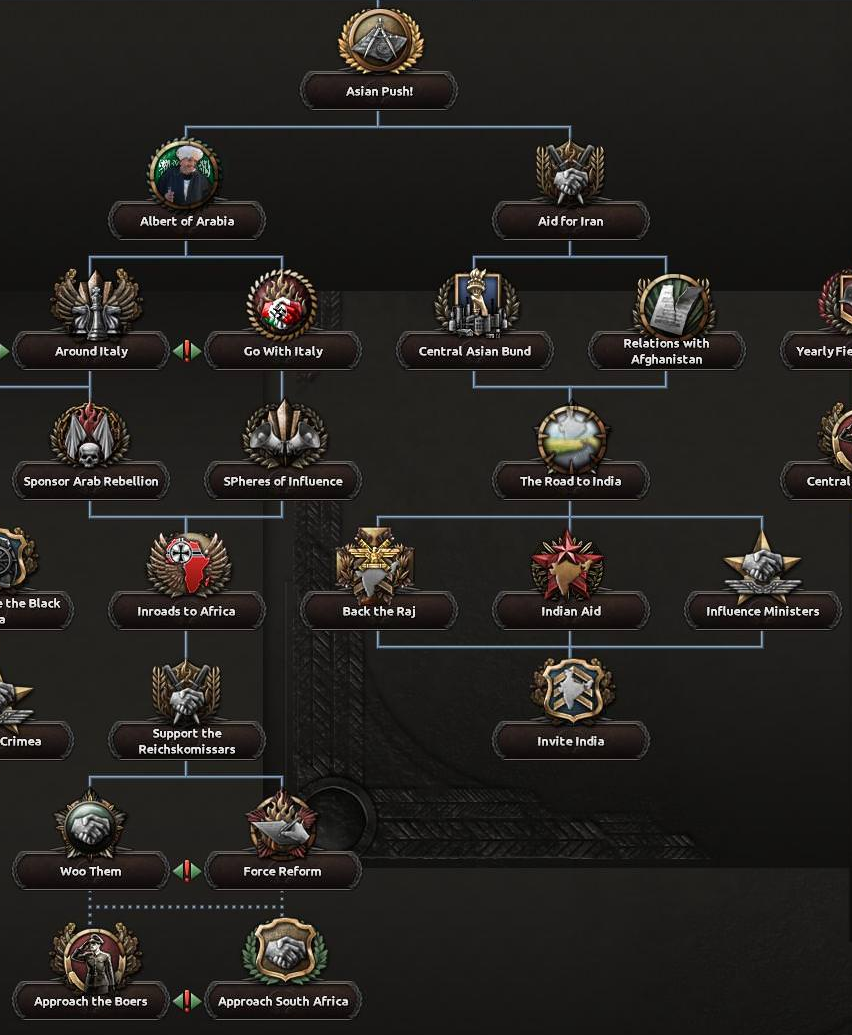
Speer can also work to make inroads into the east. In the Middle East, he may choose to either work with Italy in an attempt to divide up the region into spheres of influence, or Speer may risk everything and attempt to subvert Italy’s control of the region. While the latter may present more gains for Germany there, it also prevents Germany from working with Italy in the future.
Securing the Middle East will bring Germany down to Africa, where Speer can either try and woo the local warlords of the African Reichskommissariats or attempt to force them to follow along on his reforms, culminating in Speer choosing to either try and woo the Boers or the South African government.
Bridges can also be made to Iran, plying them with aid and assistance and using them to approach Afghanistan and the Central Asians and, more importantly, India. Speer has the best chance of any of the German leaders to woo India to his side, but like with Italy and Turkey, it will come at much cost, and there is no promise the Indians will honor any deal made.
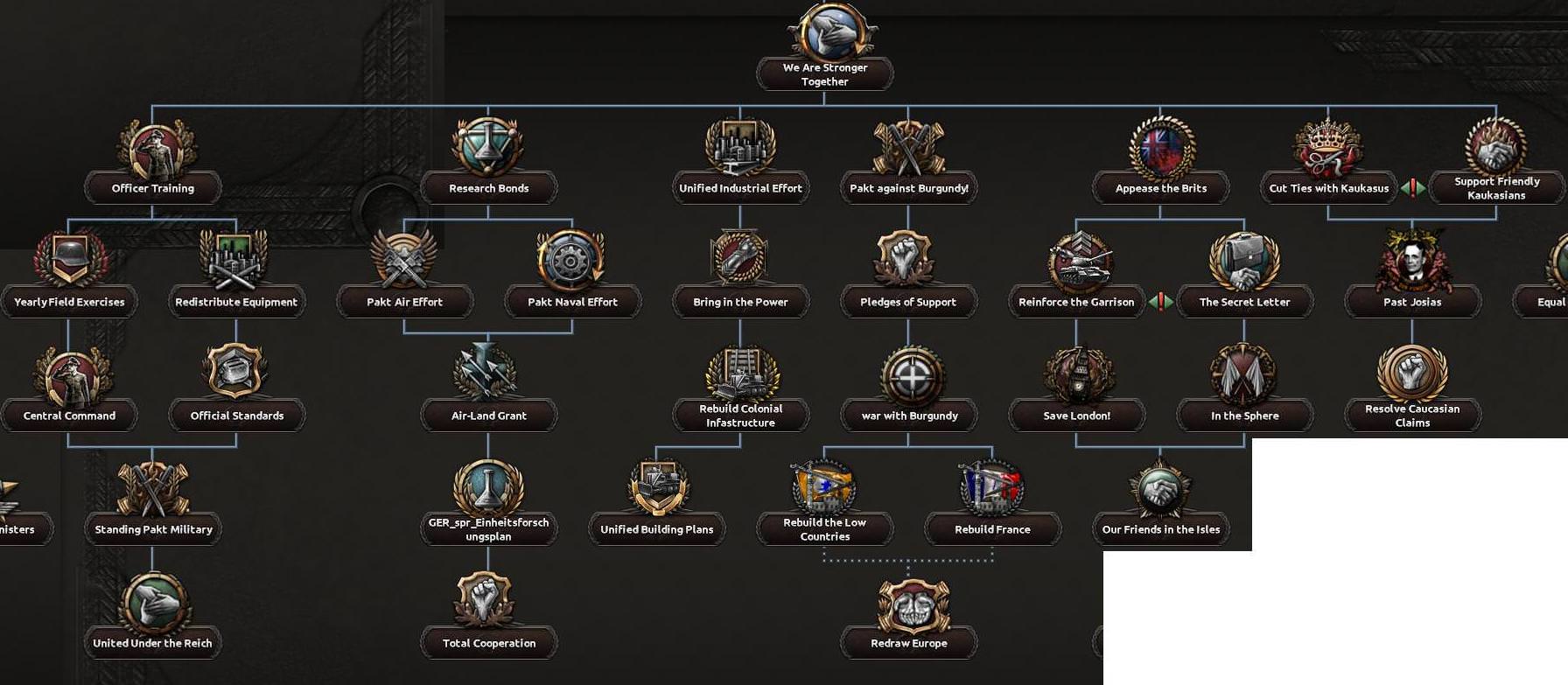
Finally, Speer can also work to improve and uplift the Pakt from a loose net of Germany’s vassals into an actual, viable organization. This can be done through a unified officers program and, eventually, a united Pakt Military to work for the common good of the entirety of the alliance, a mutual research program to ensure the entirety of the Pakt remains relevant technologically, and a unified industrial plan, with equally united standards.
Work can also be made to close off the weakest points in the Pakt. Kaukasia can either be excised from the Pakt once and for all or Speer can work with friendly elements in Josias’s government in an attempt to break his stranglehold on the nation.
The English can be approached, and Speer can either treat with the Collaborators or betray them and work directly with the English resistance, offering to welcome the Queen back and withdraw the garrison in return for the English remaining either in the Pakt or neutral, though it’s doubtful that they’d be entirely willing to accept this, it just may avoid an all out war in England.
And of course, the stand can be made against Burgundy, once and for all breaking Himmler and his foul order with the full support of the Pakt.
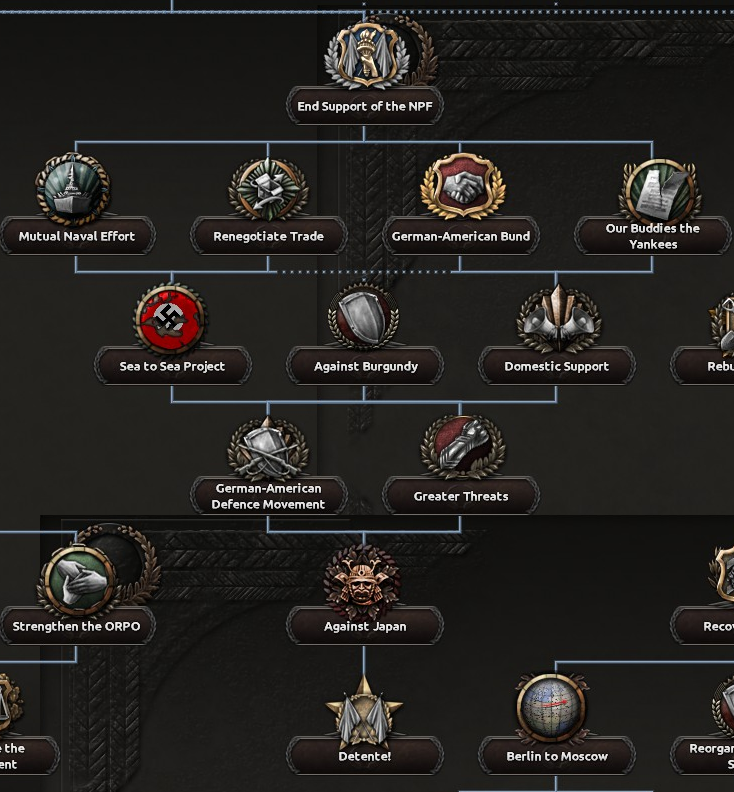
Finally, there is the America tree. Speer is the only one of the four German leaders with a shot at treating with the American government. Like with the KN, this is very reliant on Germany’s political and economic status, but if enough work is made then Speer and the Americans can eventually declare Detente, and both focus instead on combating the Japanese.
We have now gone over Speer, but he is still not the only contender for the Reich, in fact he’s one of the least likely to take power. Let’s look at the next on the political spectrum and most likely to grab power during the Civil War and before. Martin Bormann, Hitler’s personal secretary and poster boy of the Nazi conservatives in the Reichstag.
Bormann’s Reich:
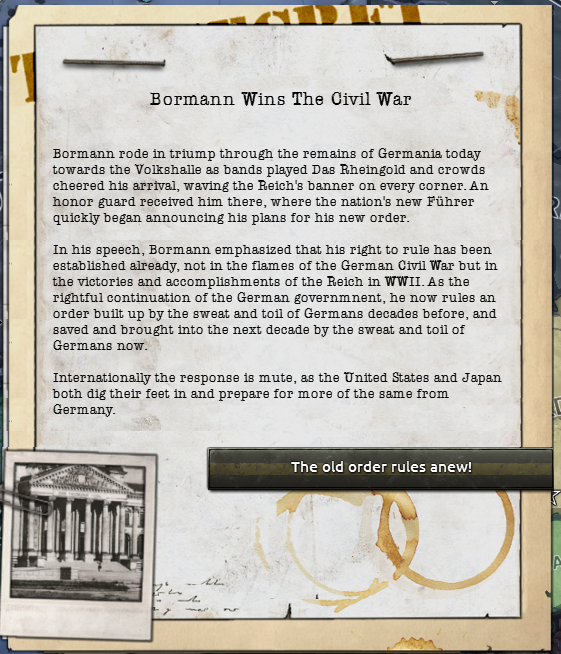
With Bormann in power, the Reich… well it will remain the Reich we all know and loath. His claims that the Reich needs no serious change are shown in his actions, as he seeks to merely try and repeat what the Reich was already doing but with a different spin. The only thing allowing him to do this is the fact he managed to kill most of those who disagreed with him during the war, and with most of Göring’s former supporters flocking to his banner after their defeat, he can afford to wipe out the remainder of those against his regime.
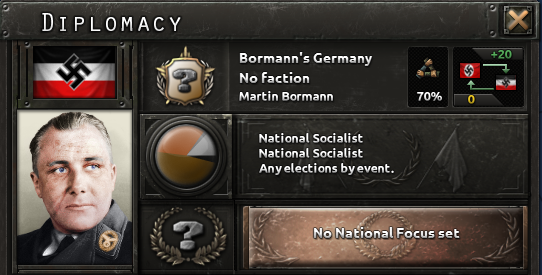
Bormann represents the continued stagnation and an attempt at a bitter revival of the Reich. He does not represent the change and movement the Reich desperately needs to survive in any capacity. This won’t stop him from riding the German bull and pretending like he’s a cowboy, and it won’t stop Germany from goose stepping happily along after him. Bormann is more for the AI to pick, but a player can also choose him and have fun making things explode internally. Many, many of his focuses contain descriptions like “This probably isn’t a great idea.”
On the other hand, his tree is quite a bit larger, to add a few alternatives to what seem to be clearly bad decisions.
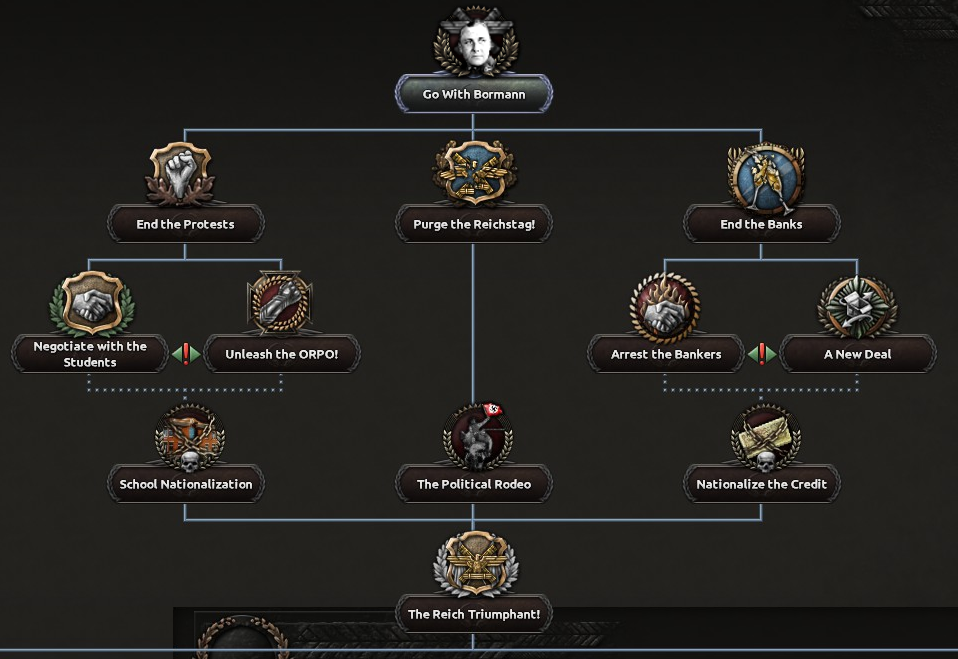
First off for Bormann is setting up his new regime. The final remnants of his enemies need to be removed from the Reichstag once and for all, and the Great Negotiator must manage the organization and convince its politicians to his side to finally settle the government.
The banks must be dealt with, much like Speer, and either negotiated to begin working with the government instead of against it or finally dismantled.
The students also need to be handled, and Bormann can either try and convince them that his way is the best way, through methods which some scholars would call lying, or simply unleash the police once and for all and negotiate with them at the other end of a bayonet.
Regardless of the paths taken here, Bormann has the easiest time dragging the Reich back under his control to represent the large acceptance of him as the Reich’s successor, and it won’t be long until Bormann begins his… reforms?
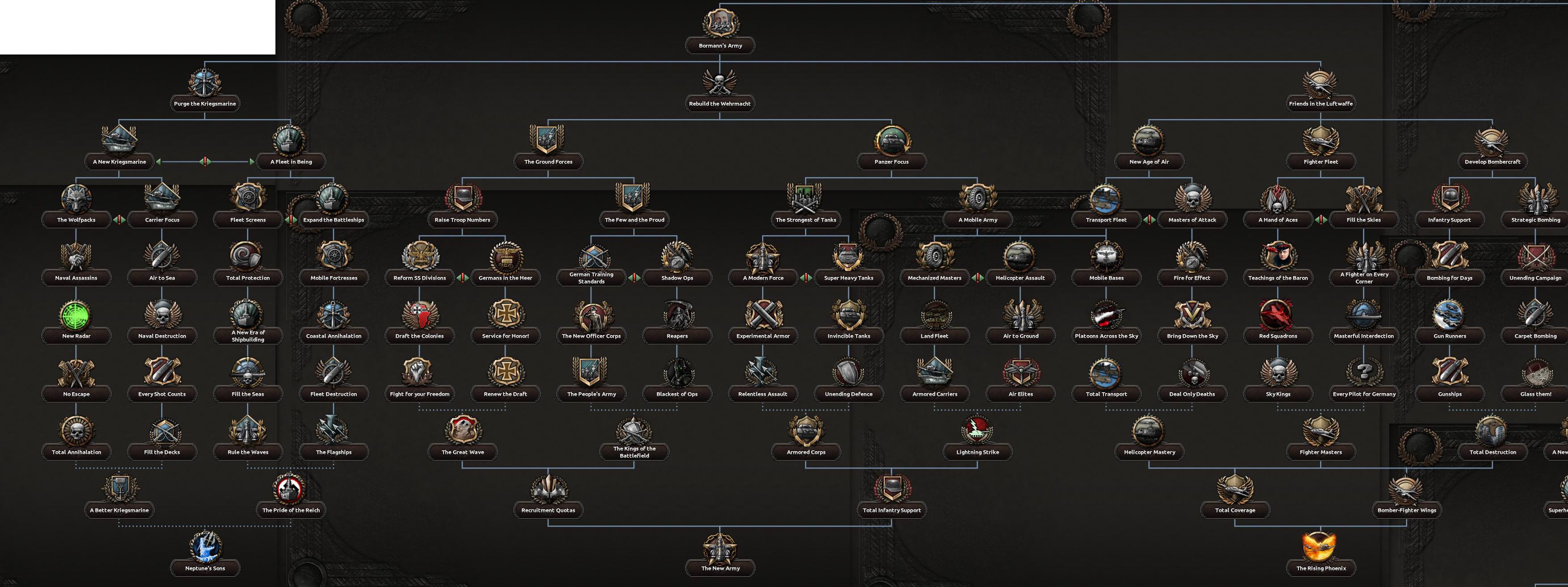
First up is Bormann’s much, much larger military tree. The military being over bloated and in desperate need of cutting down is simply a myth. It simply needs a bit of direction, not complete revolution!
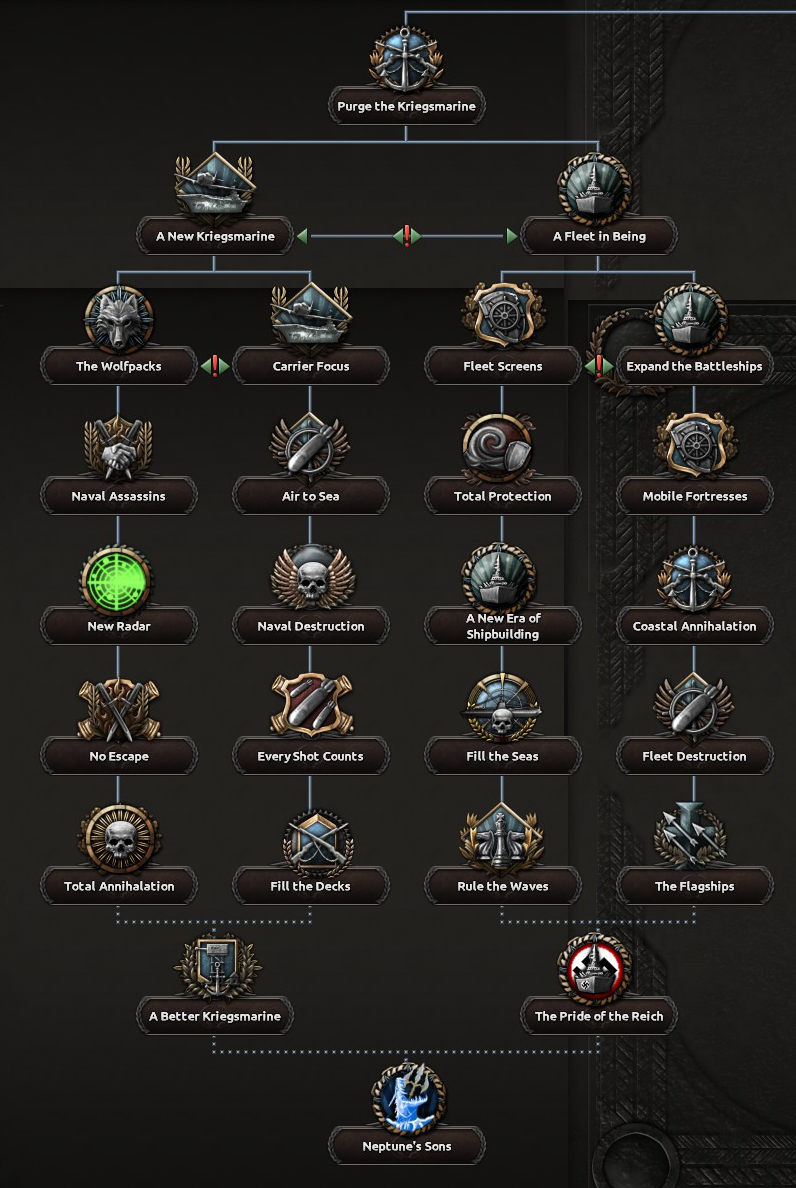
First is the decision of how exactly the Kriegsmarine will be handled. Either the navy will focus on jumping at all the new and fancy technologies that the 1960’s have presented Germany, with a massive carrier fleet to match America’s or going back to its roots and making the largest and most advanced submarine fleet imaginable.
Or, Bormann can focus on making the great and feared fleet of the Reich even greater and feared...er, and focus on either upgrading Germany’s battleship fleet and building it even larger or building up their smaller counterparts and focusing on making the Kriegsmarine as large as imaginable.
It’s quite simple, if you say there isn’t a problem, the problem seems to go away.
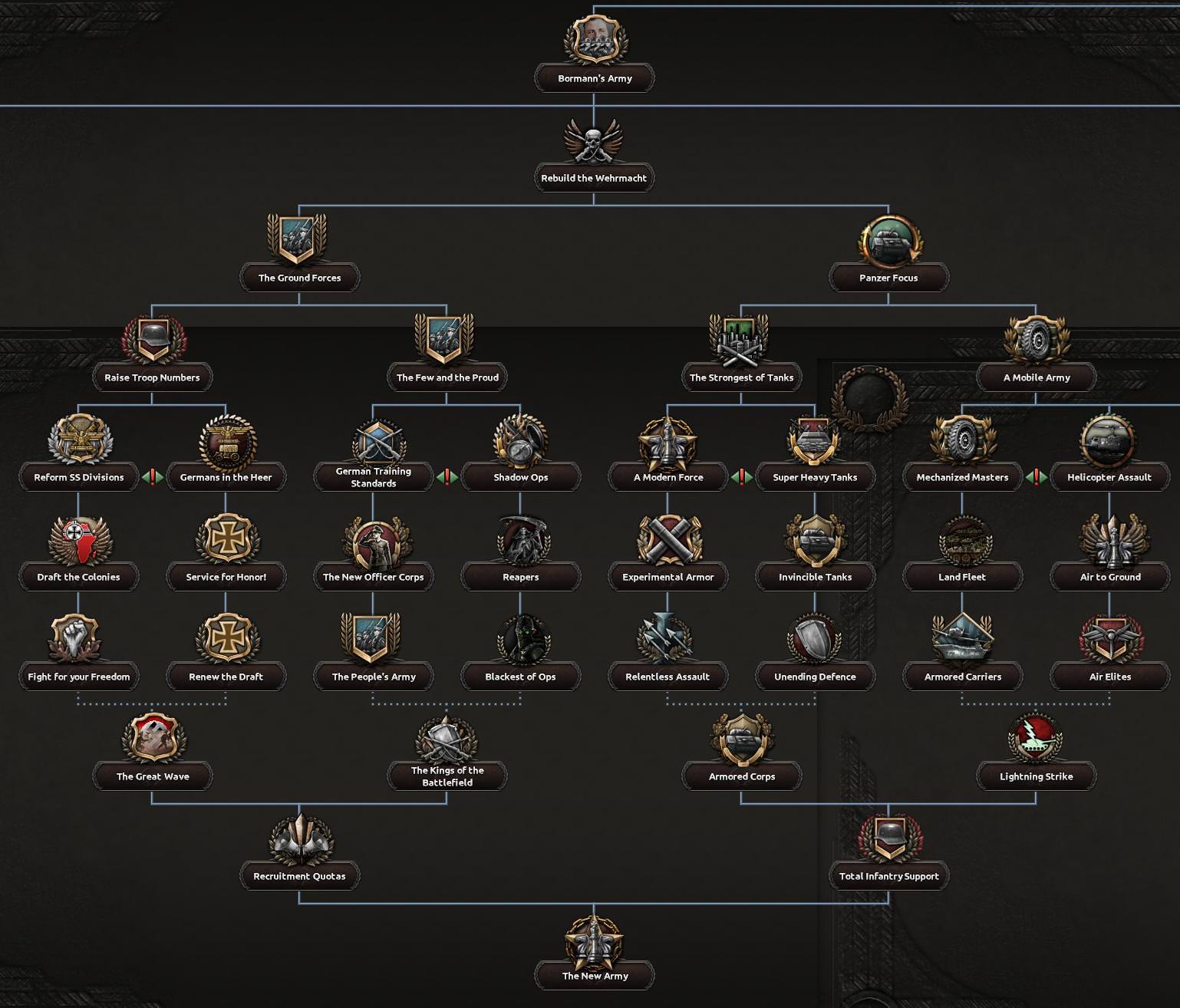
And that sentence brings us to Bormann’s Army tree. Two areas need to be looked at independently, the infantry forces and the armored corps.
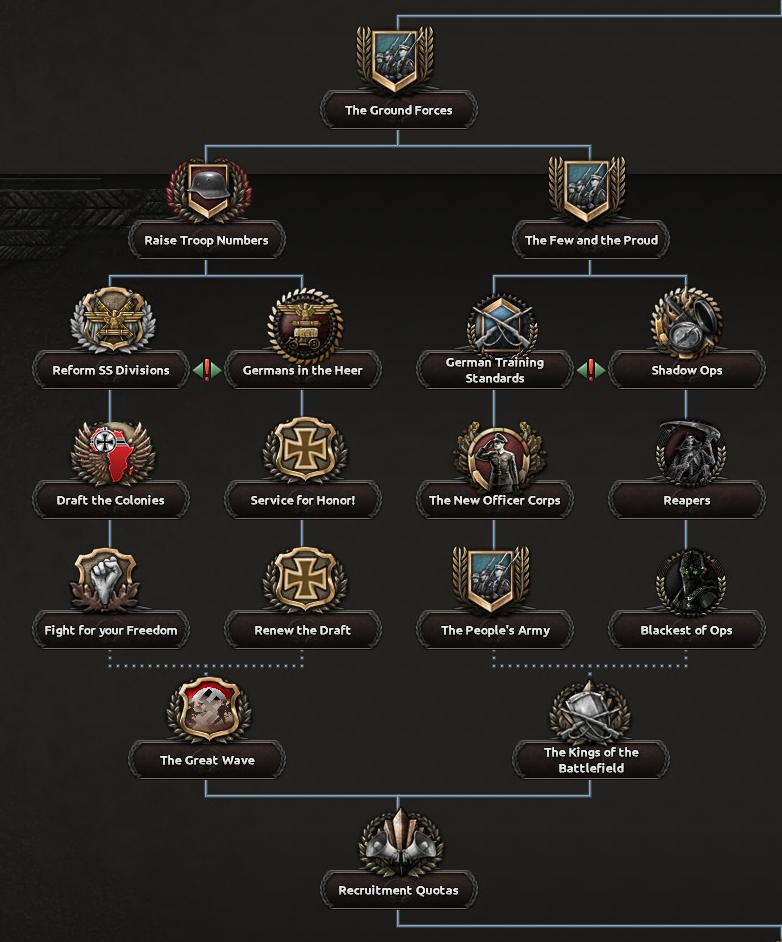
For the infantry, Germany needs to both build up its troop numbers to match the Japanese and improve its training and funding to match the United States. There are two options for both. For building up the size of the military, Bormann can either focus on reforming the now scattered foreign SS divisions and dragging them out of the control of what remains of the SS and into the Wehrmacht proper, expanding them and making them a truly massive fighting force.
Or he can focus on bringing Germans back into the military, convincing the youth once more that fighting in the military is the most honorable of professions and redeveloping the nation’s draft to include all Germans of fighting age.
For making Germany elite, Bormann can choose to either increase the focus on improving the ground forces in general or in Germany’s special forces. On one hand, the officer corps and the training regime of the German military will be overhauled to ensure every part of the Wehrmacht is made into a superior fighting force than those fools abroad, and on the other, the focus will be made on making the German special forces the single most deadly, secretive organization on Earth.
Making shadowy organizations with murky amounts of power and vast amounts of funding and weaponry has worked great for Germany in the past and probably will again.
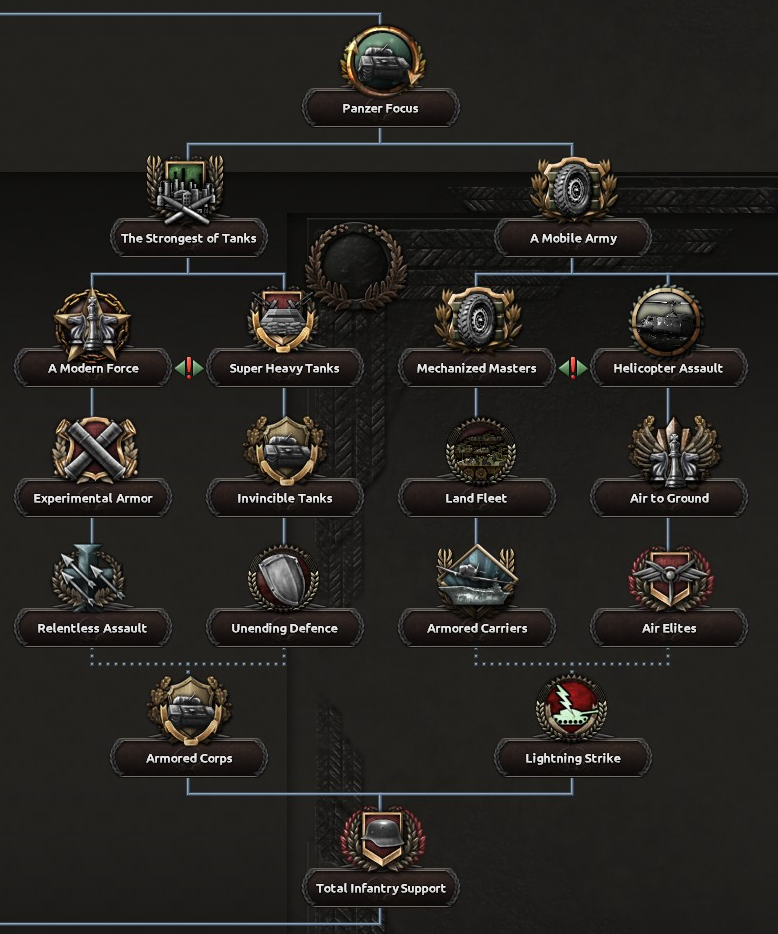
Finally for the ground forces, the armored corps and the mechanized divisions will need to be refocused.
For the armor, Bormann has the choice between the boring option of retrofitting the nation’s tanks and converting them into a more modern force, based off American designs and philosophies (though, of course, those were probably stolen from Germans, foreign nations could never hope to match the superiority of thousand folded German Panzer armor!).
Or he can go through the much more sensible path and focus on the real beast of a modern battlefield, superheavy and super expensive mammoth tanks designed to be mobile fortresses with speeds just above a literal castle.
For the transport fleet, Bormann, much like Speer, can focus on either developing the mechanized section of the military to be able to overwhelm and surround any armies who dare oppose the Reich, or, if he has also focused on transport helicopters in the air tree, in building up the air transport fleet to properly swarm any enemy position with infantry from above.
And on that, onward to the amazing developments occurring in the air tree.
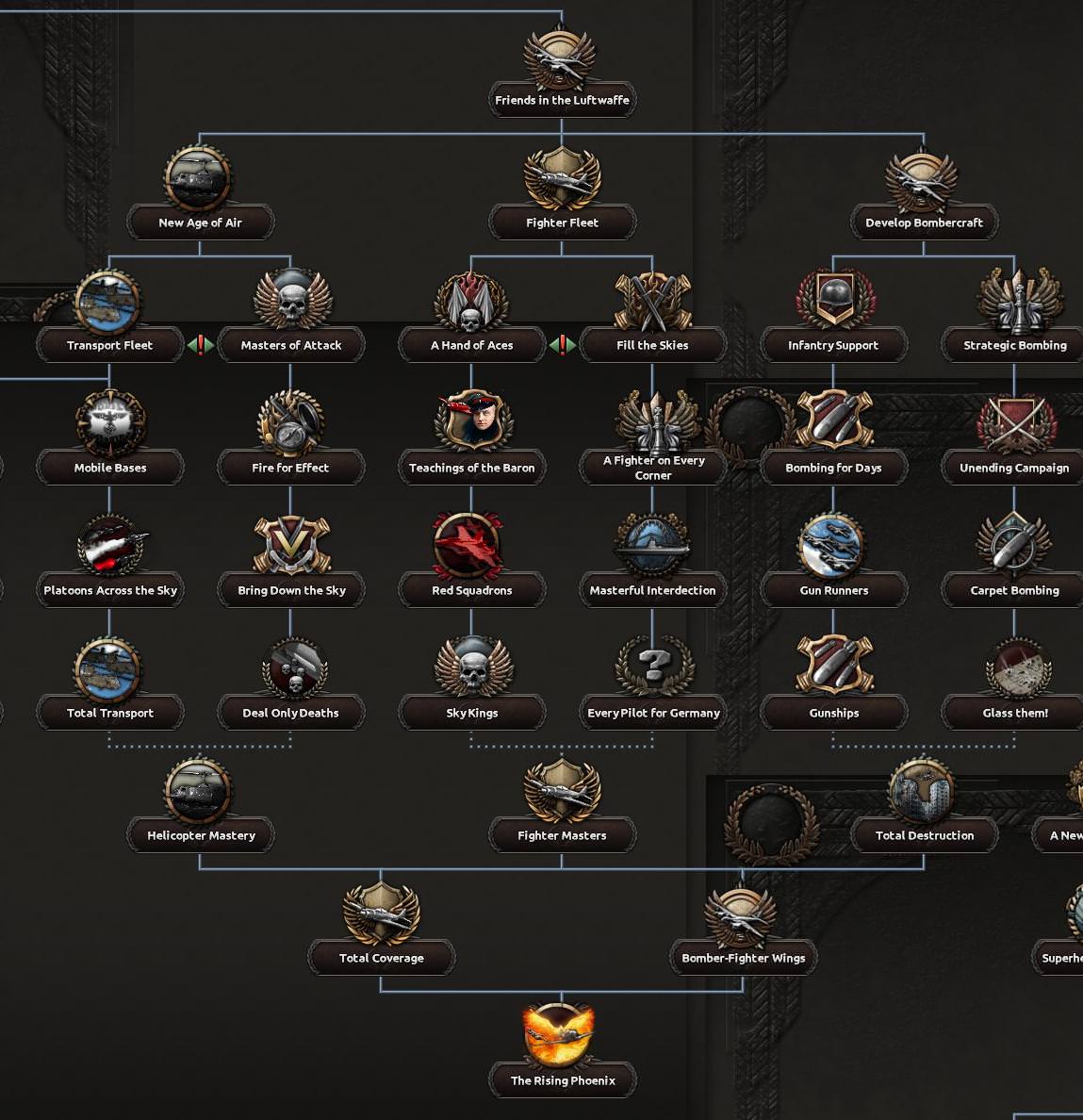
In the air tree, Bormann will look towards building up the three pillars of the Luftwaffe. The helicopters, the fighters, and the bombers.
For helicopters, the decision is between a transport fleet capable of moving the infantry wherever they need to go, rapidly, and in great number, or building up the fleet of attack helicopters to be able to properly wipe out anything that Bormann deems in need of being wiped out. Which is… a lot of things.
Next up is the fighter fleet, with the decision being either for Germany to focus on establishing the most elite cadre of pilots on Earth, with every German flier being worth a dozen of his counterparts, harkening back to the Red Baron and pioneers of German aviation of old, or on filling the skies with hundreds and hundreds of planes to make any enemy of the Reich quiver in fear.
Finally, for bombers, the decision needs to be made between focusing on tactical bombing to support the infantry and break the enemy's armies, whoever they may be, or strategic bombers with the goal of utterly wiping out any trace of the enemy and their industries and homes.
Military buildup brings pride to the Reich. Pride is the only thing that Bormann and his most ardent supporters believe was missing. A proud Germany is a strong Germany, a Germany where every man woman and child looks at their military in awe and wonder.
Speaking of wonder, it’s onto Bormann’s science tree.
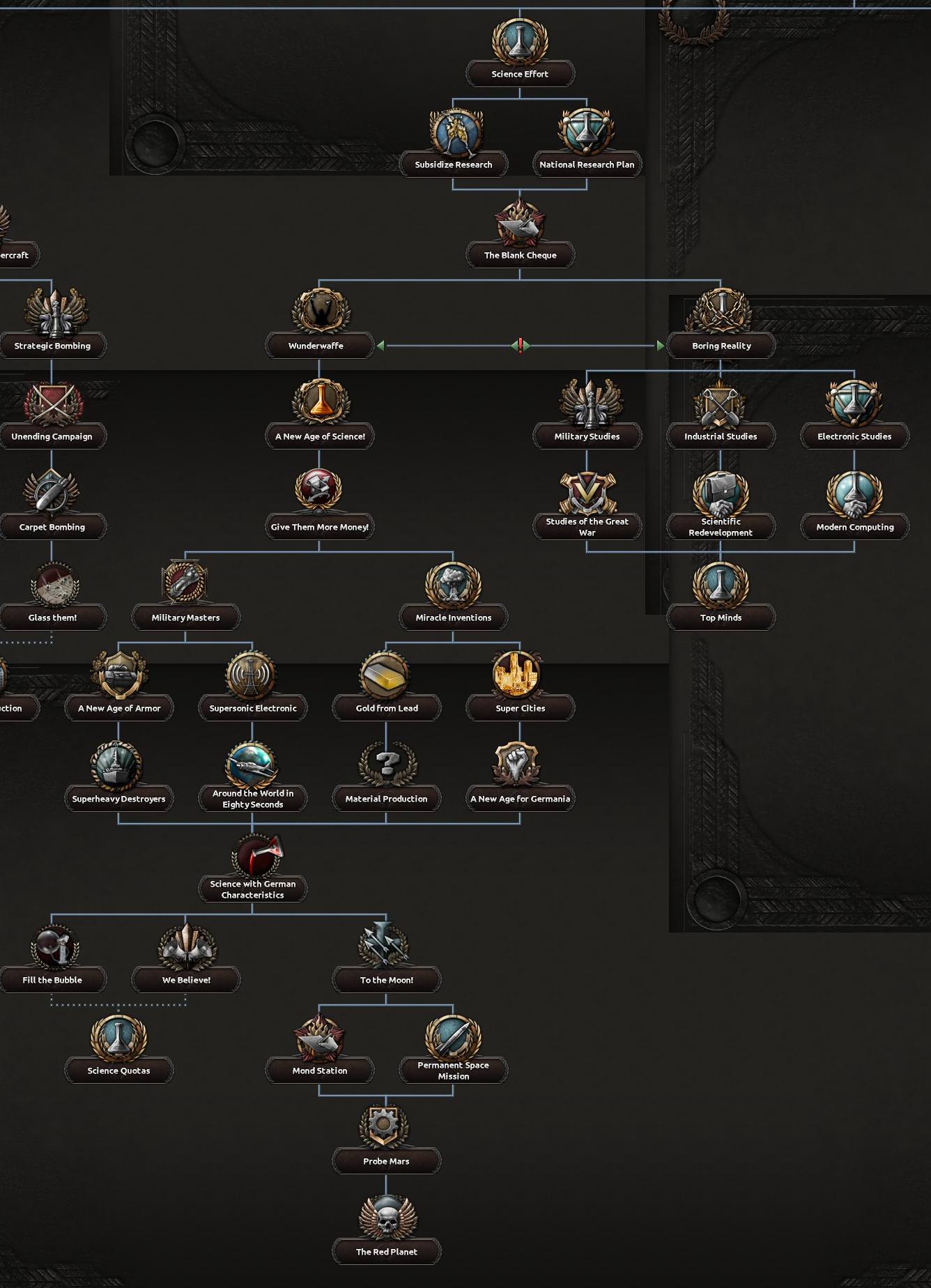
Bormann believes in Germany’s scientists! A blank cheque will be written off to the nations researchers with one simple goal: Make the magic happen!
The choice needs to be made, either Bormann can focus on the boring aspects of science, looking into things like modern computing systems and industry and military studies, a limited path due to a lack of interest on behalf of the government…
Or they can go fully into the miracles of Wunderwaffe! Wunderwaffe won Germany the last war and they will win Germany the next! Money can be thrown at both military and civilian attempts, aimed at making German science a beast willing to tackle those things that other nations write off as ‘infeasible’ or ‘too amazing’ or ‘useless money sinks more likely to detonate and kill the science team than actually produce viable results’.
Towards the end of the tree, Bormann can demand inventions be made on quota, no doubt something that will be great for the propaganda machine. He can also finish the space race once and for all, promising Germans that boots will eventually land on Mars and show the Japanese and Americans who rules the cosmos once and for all!

Next up is answering the legion of issues on Germany’s industry, issues even Bormann can’t just print money to throw at in order to fix.
A decision needs to be made, either redevelop the heartland and try and bring as much of the nation as possible up to par or focus entirely on Germania, tearing apart smaller cities and such to make Germania and the rest of the Reich’s great cities even greater!
Effort must also be made to get the people back to work, both slaves and Germans. For the slaves, this will be done through limited concessions about silly things like their well being and regularly having food to eat, while also building up the infrastructure to properly monitor and police them to ensure they remain unable to revolt.
Germans should also start working eventually, and by pressuring them to get back into the factories, making quotas to force factories to maintain a German staff, and ensuring the Germans don’t have to interact with the slaves, Bormann hopes he can encourage the Reich to get back to work, once and for all.
And of course, when all that’s finished, it’s time to throw money back at more super projects! Who said we had to stop at the Volkshalle?
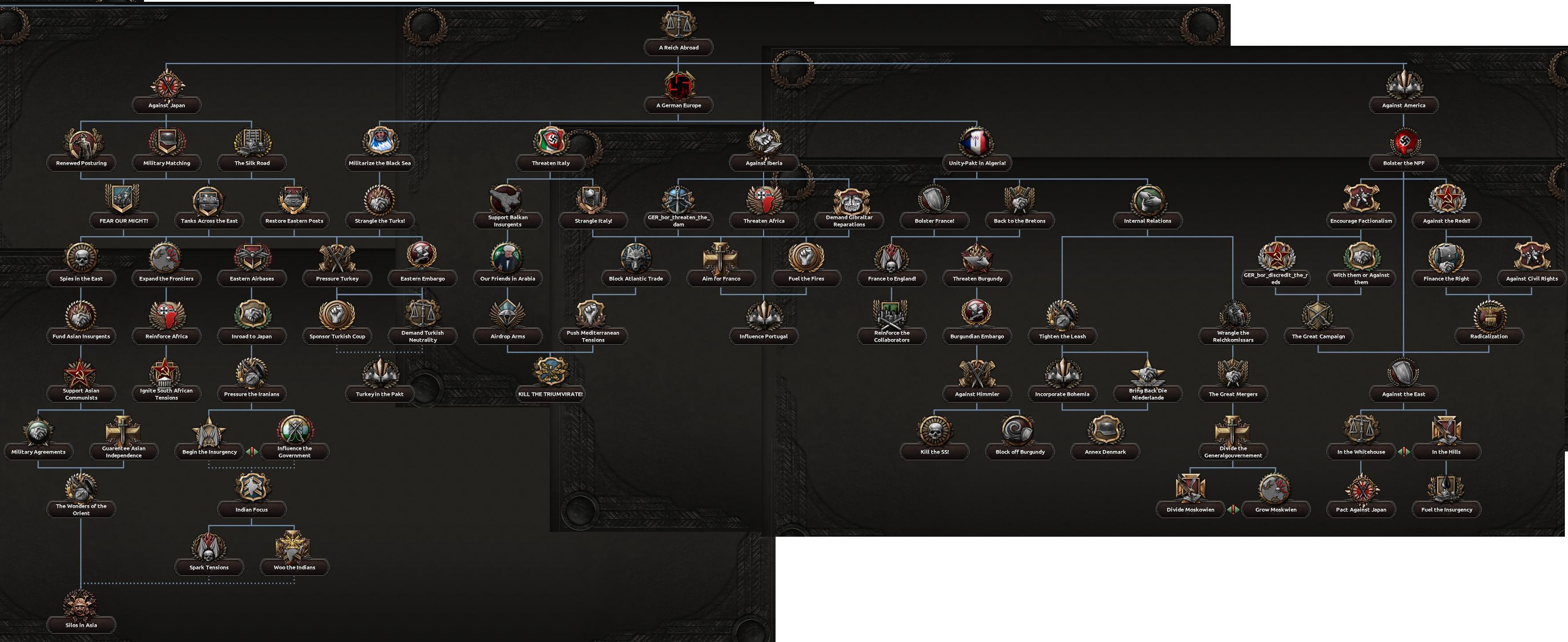
Finally, for Bormann, is the diplomatic tree. Or, well, the sabre rattling tree, to be more precise.
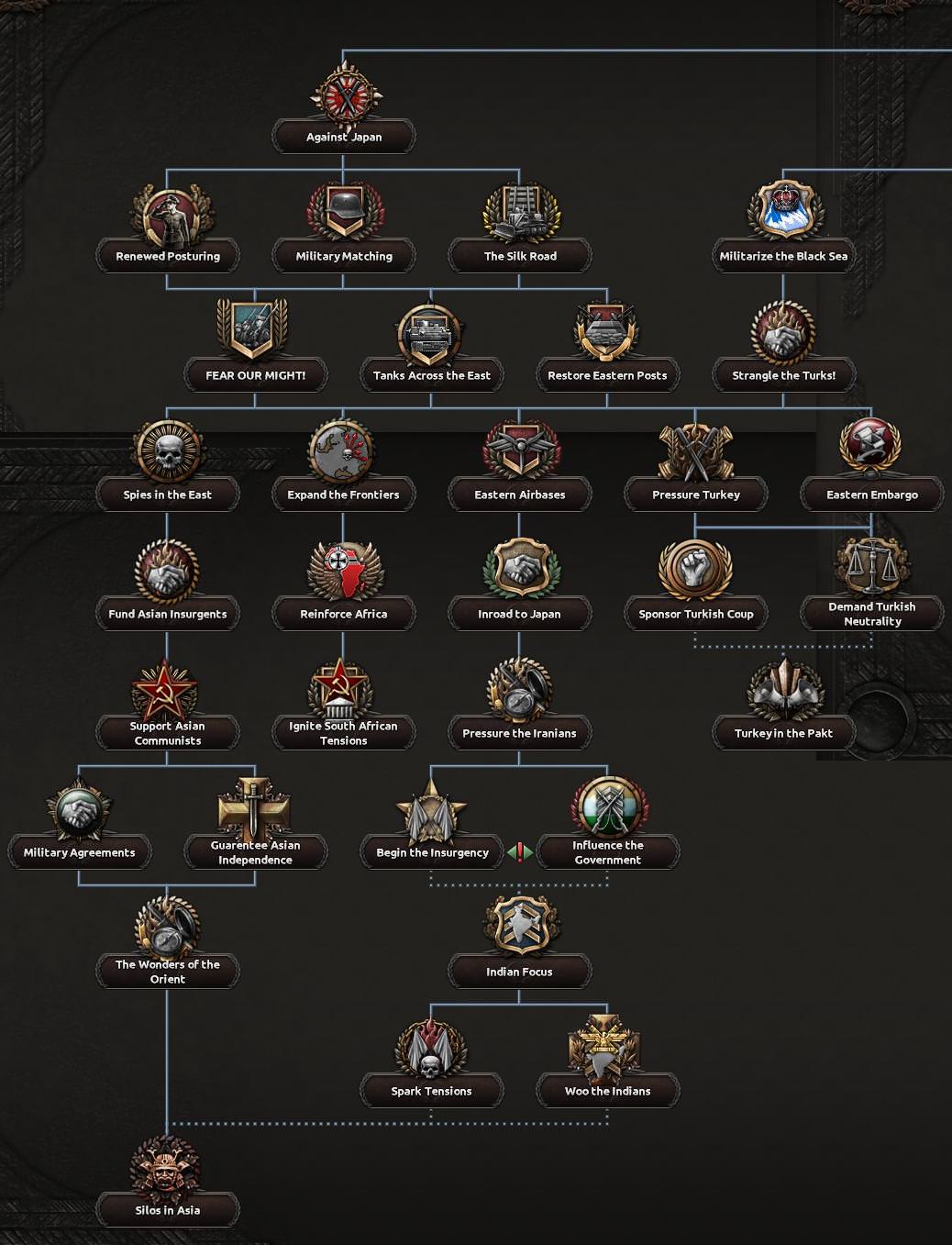
Germany’s greatest opponent is Japan, and curbing their power and putting the Imperial upstarts back in their place is one of Bormann’s top goals. To do this, the Reich will need to find inroads east, mainly through Turkey. Turkey will need to be dragged into the Reich’s sphere or at least forced to let the Germans find their paths eastward, mainly through economic strangulation and the funding of rebels in the Middle East.
With Turkey properly in danger and German garrisons in the east, mainly in Kaukasus, whether Josias likes it or not, the path to Iran is now open, as well as down through Africa and into Japan.
Iran remains a very important issue for Germany, as the nation controls the most stable roads from the Reich to the much more important nation in international affairs, India.
India is the Cold War’s wildcard, Germany, Japan and America have for years been attempting to court her as the winning piece in the Cold War. For Japan, bringing India under their sphere means controlling the entirety of Asia besides Australia and New Zealand, and firmly locking down the Co-Prosperity Sphere from all external threats. For the United States, India would be a powerful ally to counter Japan, give valuable paths deeper into the Orient and give vital supply lines to Australasia, as well as an entrance into the Middle East. For Germany, the idea is largely the same, to counter Japan, they need a strong ally to do so, and India is their only option in the region that seems to be accepting their money.
With Iran either properly dragged into Germany’s sphere or in a state of collapse and unable to stop Germany from using it as a stepping stone east, India becomes wide open to more direct German influence.
Getting paths east and through Turkey also gets Germany to the Red Sea and down the coast of Africa. The frontier of the Reichskommissars in the south, long having dwindled and fallen apart due to their distance from the ailing Germany, shall be reinforced and expanded. Moreso, efforts will be made to spark the fires of Boer aggression in South Africa, to properly begin dragging the rest of Africa into the German sphere.
Finally, action needs to be taken against Japan more directly. Insurgencies need to be financed, whether it be in China proper in Japan’s largest and most important colony, or in their puppets across the Southeast where more and more have begun vying for their independence.
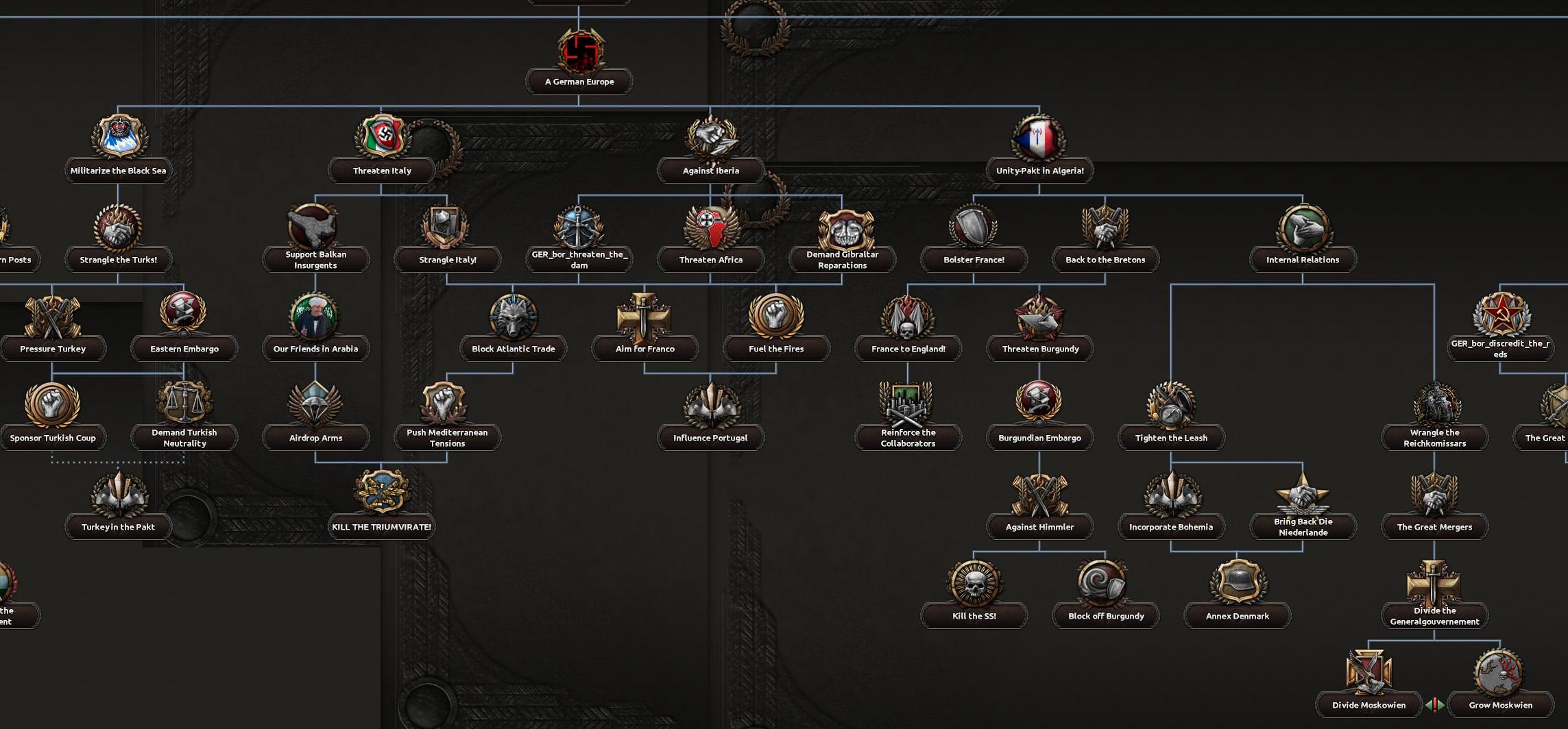
Efforts must also be made more locally, in Europe itself. The Triumvirate has proven to be a constant thorn in Germany’s side, with Turkey, Iberia and Italy all threatening German interests in Europe.
The paths here are fairly straight forward. Italy, Iberia, and Turkey all have similar paths to exploit their divides and break their will to threaten the Reich. Italy, especially, is a target for Germany, having led the Triumvirate and being Germany’s closest rival. The end of the Italy tree, once Italy is sufficiently consumed in German sponsored rebellions and struggling to maintain its economies through German efforts, can be the target of a military intervention. What’s the use of a super inflated military if one is not willing to use it?

Reforms can also be made to the Reichskommissariats and the Unity-Pakt.
One important thing Bormann is like to do is to defend the Pakt at any cost. This means that Germany will gladly support the French claim to Algeria, against both Iberia and Italy! Even though France’s membership in the Pakt has always been a bit tenuous, no doubt they will be more than happy with Germany if they are given their favorite colony back!
Wrangling the Reichskommissars is also an issue for Bormann, and to do so, he plans on sweeping changes in the east. Some of the Reichskommissars are rebellious, some loyal, and there are so many to manage. Who knew running a continent would be so complicated? The simple solution is find those loyal and give them more land, at the expense of those who dare oppose Bormann or happen to be in the way.
Bormann can choose to unify several of the Reichskommissars and divide up some of the larger ones, namely Moskowien, to ensure the loyalty of the rest. Surely giving the dubiously loyal and always scheming Reichskommissars more power and tearing apart the administrations barely handling their constantly revolting populace can only end in great things.
Most importantly, however, Bormann can take a stand against Burgundy. With France receiving new garrison of soldiers and supplies and the Bretons reapproached to ensure their loyalty to the Pakt, Bormann can threaten Burgundy directly. The choice needs to be made, block off Burgundy from the world and ensure they can’t bother their betters ever again, or show Himmler who really rules Europe and invade directly?
Finally, Bormann can meddle on one more continent.
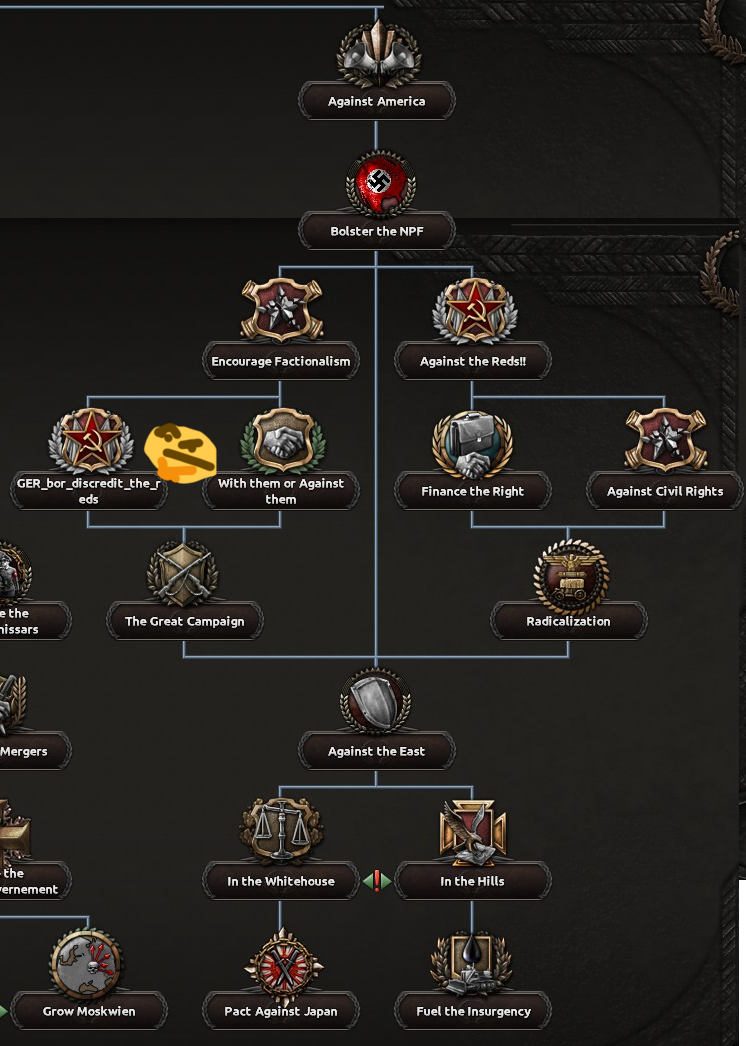
Talk of ending support of the NPP is nonsense. Some say it’s a money sink that has done little besides further discredit the organization and Germany’s only chance to shake up the American establishment, but others say those people are dirty liars and should have died with the rest in the Civil War.
The support to the NPP can be bolstered further, with Bormann attempting to draw the party further right and support them in their various political campaigns, namely emphasizing America and Germany’s mutual hatred of Japan. This can culminate in either the NPP winning the Whitehouse, and Germany attempting to form a mutual pact to stand against the Empire, or, in the more likely event that German support and meddling backfires and the NPP fails to gain any meaningful power thanks to it, can attempt to sponsor an insurgency in the United States to distract the Americans and force them to focus inward.
When has attacking the United States ever backfired?
Conclusion:
Thanks for reading this extremely late and difficult to make and exceedingly long dev diary for The New Order! I hope you enjoyed reading this as much as I died writing it (spent about 14 hours in a day and a half finishing this), and that you are as excited as I am to see what else Germany has in store in our next dev diary!
We may throw in another development update in the meantime, depending on how quickly we polish up the other two sections of the German tree, but we’ll announce that sometime next week.
Thanks for reading! And of course, find us at our Discord, on Reddit, ModDB, the Paradox Forums, and Alternatehistory.com!

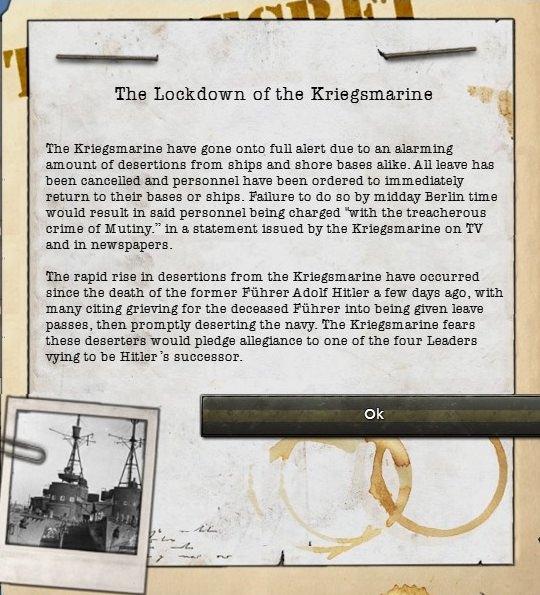

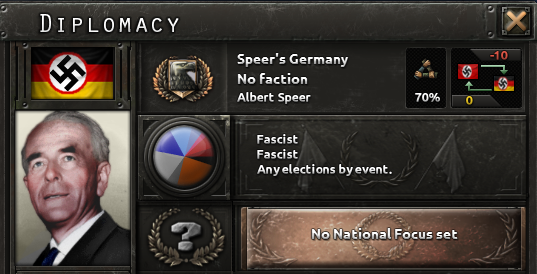
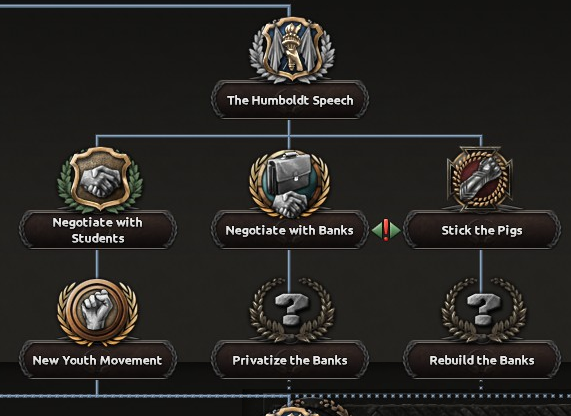



Absolutely incredible dev diary, I love this. It's awesome to read about the situation a collapsing 1960's Nazi Germany finds itself in, as well as all the imaginable different roads the empire can go down with Speer and Bormann. Great tech trees as well, especially with Speer's massive architecture projects and Bormann's crazy military and wunderwaffe misadventures!